《大学英语四》习题三答案
新视野大学英语第三版读写4 Unit7 课后3-6-7习题答案

there was once a time when they were on the fringe of American political life.虽然保守派今天在主流政治中占据主导地位,但曾经一度处于美国政治生活的边缘。
2.The World Health Organization (WHO) was established in 1948, and one of its first responsibilities then was to unify the separate international health-related treaties in a single code.世界卫生组织(世卫组织)成立于1948年,当时它的首要职责之一是将单独的与卫生有关的国际条约统一为一个法典。
3.Because of over-hunting, the number of certain types of whales has been reduced so greatly that they are in danger of becoming extinct .由于过度捕猎,某些种类的鲸鱼数量已经大大减少,它们有灭绝的危险。
4.The senator, who was against the war, claimed that with all the indefinite and complex economic and political factors, the outcome of the war was still uncertain.这位反对这场战争的参议员声称,由于各种不确定和复杂的经济和政治因素,战争的结果仍然不确定。
5.Online shopping and other electronic services could well slash the number of entry-level jobs in the traditional retail sector.在线购物和其他电子服务很可能会大幅削减传统零售业的入门级工作岗位。
《大学英语四》习题三答案

大学英语四(Model Test 3)一、社交英语 Communicative English(本大题共 10 小题,每题 2 分,共 20分)1.—How are you,Bob一B Ted.A .How are you B.I ’ m fine. Thank you.C.How do you do D.Nice to meet you.2.—Thanks for your help.—AA .My pleasure.B.Never mind.C.Quite right.D.Don’ t thank me3.一 Hello .I ’ m Harry Potter.一 Hello ,my name is Charles Green, but C.A . call my Charles B.call me at CharlesC. call me Charles D.call Charles me4.一 Paul,A一Oh, that ’ s my father! And beside ,himmy mother.A .what is the person over thereB.who’ s talking over thereC.what are they doingD.which is that5.一 Hi ,Tom, how’ s everything with you—B,and how are youA .Don’ t mention it C.Thanks B.Hmm, not too bad D.Pretty fast6.一 That ’ s a beautiful dress you have on!—AA .Oh,thanks.I got it yesterday.B.Sorry,it ’ s too cheap.C.You can have it.D.See you later.7.一 Why didn ’ t you come to my birthday party yesterdayDA Excuse me my friend sent me a flowerB Fine I never go to birthday partiesC Ha ha I don ’ t like birthday partiesD Sorry but my wife had a car accident8Hi welcome back!Had a nice tripAA Oh fantastic!Fresh air and sunshine every dayB Come on I’ve got lots of funC By the way I don ’ t like SaturdaysD Well I'll look forward to your phone call9Haven’ t seen you forages!What are you busy doing now DD I am working part time in a bookshop you know10Marilyn I'm afraid I have to be leaving now —BA That sounds wonderful C Not at a11B Oh so early D Good luck!二、词汇语法Vocabulary and Grammar(本大题共15 小题,每题 2 分,共30分)11. Would you like something _______B_______A. drinkB. to drinkC. drinkingD. for drinking12. The wild flowers looked like a soft orange blanket _____A_______ the desert.A. coveringB. coveredC. coverD. to cover13.______D_____ is the population of ParisA. How manyB. How muchC. HowD. What14. As the busiest woman there, she made ___D________her duty to look after all the otherpeople's affairs in that town.A. thisB. thatC. oneD. it15.It was getting ______C_____ , he had to stop to have a rest.A. very darkerB. dark and darkC. darker and darkerD. darkest and darkest16.This overcoat cost ____B_______. What's more, they are __________small for me.A. very much; veryB. too much; much tooC. much too; too muchD. very much; too much17.The film brought the hours back to me A I was taken good care of in that remote village.A. whenB. whereC. thatD. until18.— Did the medicine make you feel better— No. The more _____B______, ___________ I feel.A. medicine I take; and the worseB. medicine I take; the worseC. I takemedicine; the worse D. I take medicine; worse19. It is not until you have lost your health ____D________ you know its value.A. untilB. whenC. whatD. that20. It's high time that he settled down in the country and B a new life.A. startB. startedC. startingD. to start21.I won ’ t make theB__mistake next time.A. likeB. sameC. nearD. similar22.----The baby is hungry.---- But there ’As___milk in the bottle.A. littleB. a littleC. fewD. a few23.----_B__is your girl friend like----She is very kind and good-lookingA. HowB. WhatC. WhichD. Who24.----She has two best friends.----__D_of them is in the country.A. AllB. BothC. No oneD. Neither25. You __B__ buy some reference books when you go to the college.A. couldB. will have toC. must toD. might三、阅读理解 Reading Comprehension本大题共15小题,每题2分,共30分Passage 1How men first learnt to invent words is unknown; in other words, the origin of language is a mystery. All we really known is that men, unlike animals, somehow invented certain sounds to express thought and feelings, actions, and things, so that they could communicate with each other; and that later they agreed upon certain signs, called letters, which could be combined to represent those sounds, and which could be written down. Those sounds, whether spoken or written in letters, we call words.The power of words, then, lies in their associations - the things they bring up before our minds. Words become filled with meaning for us by experience; and the longer we live, the more certain words recall to us the glad and sad events of our past; and the more we read and learn, the more the number of words that mean something to us increases.Great writers are those who not only have great thoughts but also express these thoughts in words which appeal powerfully to our minds and emotions. This charming and telling use of words is what we call literary style. Above all, the real poet is a master of words. He can convey his meaning in words which sing like music and which by their position and association can move men to tears. We should therefore learn to choose our words carefully and use them accurately, or they will make our speech silly and vulgar . (239words)26.The origin of language is _______D__________A. a legend handed down from the pastB. a matter that is hidden or secret.C. a question difficult to answer.D. a problem not yet solved.27.What is true about words ______C__________A. They are used t to express feelings only.B. They can not be written downC. They are simply sounds.D. They are mysterious.28.The real power of words lies in their ___D________.A. propertiesB. characteristicsC. peculiarityD. representative function29.By “ association ” , the author meansB_______.A. a special qualityB. a joining of ideas in the mind.C. an appearance which is puzzling.D. a strange feature.30.Which of the following statements about the real poet is NOT true ___A_______A.He is no more than a master of words.B.He can convey his ideas in words which sing like music.C.He can move men to tears.D. His style is always charming.Passage 2Long, long ago there was a very foolish thief. Do you know what he did one day When he wanted to steal the bell on his neighbor's door, he walked up to the door, took hold of the bell and pulled hard. The bell made a very loud noise. The thief was afraid and went home.Then he sat down to think, "I must do something about the noise," he said. He thought and thought. At last he had an idea. "Ah, I'll put some cotton in my ears. Then I won't be able to hear the noise." The next day he went to the door of his neighbor, and took hold of the bell. This time he pulled even harder. The bell rang loudly, but the thief did not hear anything. With another hard pull he got the bell out. Just then the neighbor came running out."Steal my bell I'll teach you a lesson," the angry man shouted. And he hit the thief on the nose.The foolish thief did not know how the neighbor found out he was stealing the bell. "Why did he come out just then" he wondered.31. The thief was trying to get his neighbor's doorbell.AA. TB. F32.The thief put some cotton in his ears so as not to hear anythingA.A. TB. F33.The neighbor ran out probably because he knew his doorbell was being stolen.AA. TB. F34.The neighbor hit the thief to punish him for stealing.AA. TB. F35.The thief thought the neighbor couldn't hear the noise of the bell.AA. TB. FPassage 3It has been reported that in colleges across the United States, the daytime serial drama known as the soap opera has suddenly become "in". Between the hours of 11 a.m. and 4:30 p.m, college television lounges are filled with soap opera fans who can't wait to see the next episode in the lives of their favorite characters.Actually, soaps are more than a college favorite; they're a youth favorite. When school is out, high-school students are in front of their TV sets. One young working woman admitted that she turned downa higher paying job rather than give up watching her favorite serials. During the 1960's, it wasuncommon for young people to watch soap operas. The mood of the sixties was very different from now. It was a time of seriousness, and talk was about social issues of great importance.Now, seriousness has been replaced by fun. Young people want to be happy. It may seem strange that they should turn to soap opera, which is known for showing trouble in people's lives. But soap opera is enjoyment. Young people can identify with the soap opera character, who, like the college-age viewer, is looking for happy love, and probably not finding it. And soap opera gives young people a chance to feel close to people without having to bear any responsibility for their problems.36. What is soap opera ___C_____A. Plays based on science fiction stories.B. Plays based on non-fiction stories.C. The daytime serial dramas on TV.D. Popular documentary films on TV.37. What can be the best title of the passage ___C_____A. College student viewers.B. Favorite TV serials.C. Soap opera fans.D. College-age viewers.38.Which is not the reason why the soap opera suddenly becomes "in" according to the passage_____D___A.Because the viewers want to be happy and to enjoy themselves.B.Because the soap opera makes young people feel close to their people.C.Because the viewers can find themselves in the soap opera characters.D.Because the young people have to bear the responsibilities for their troubles.39.What can we learn from the passage ___C_____A.College students like soap operas more than any other social groups.B.Young people of sixties liked soap operas more than people today.C.Young viewers have turned themselves from the seriousness of sixties to enjoyment now.D.The young as a whole are trying to look for happy love but in vain.40.What message does the author want to convey to us ____B____A.The people's favor toward drama works has been changed for a long time.B.The people's favor toward drama works changes along with the times.C.The people's favor toward drama works is changed by the soap opera.D.The people's favor has changed the drama works.四、完形填空 Cloze (本大题共 10 小题,每题 1 分,共 10 分)Homesickness is very common among students away from home—even those who had previously been away at overnight camp or traveled far away. There is a difference between being away from home for 8 weeks and being gone for 8 months. There is also a difference between41 home for a while (knowing you will be going back) and leaving 42 (knowing you may never return). Feeling homesickdoes not make you less mature or mean you are not ready to be43. If you feel homesick, talk to yourfriends at school about it.44they are feeling the same way. 45family and friends back home,but make sure you 46new relationships at school. If your homesickness does not 47 and doesnot seem to be getting better after a few months at school, speaking with an adviser might help. Also, remember that going home for the first visit may be difficult 48changes in yourself or your family.Old conflicts do not just disappear once you go to college, and new ones may 49. Again, if thingsare too stressful for you50 handle alone, talk to an adviser.B41. A. abandoning B. leaving C. being away D. heading forA42. A. forever B. temporarily C. for a short time D. all the timeD43. A. yourself B. lonely C. of your own D. on your ownA44. A. Most likely B. It ’s impossible C. It’s lucky D. Make sureA45. A. Keep in touch with B. Contact with C. Keep contact in D. CommunicateD46. A. have built B. do C. formed D. developB47.A. go with B. go away C. go over D. go throughB48.A. thanks to B. because of C. because D. resulting inA49.A. appear B. rise C. raise D. growC50. A. too B. so C. to D. not五、作文Essay Writing(本大题共10 分)You are required to write a note to tell your boss that you cannot attend this afternoon’ s should write as least 80 words and base your note on the Chinese outline below:1.你刚接到老婆电话2.你不得不回家带儿童上医院看病3.夜晚跟老板联系。
第3版新视野大学英语4读写教程课后练习题答案(第三单元)
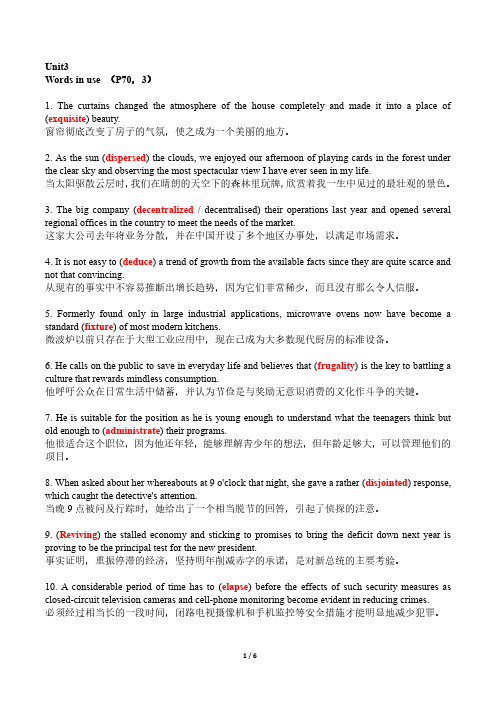
Unit3Words in use (P70,3)1. The curtains changed the atmosphere of the house completely and made it into a place of (exquisite) beauty.窗帘彻底改变了房子的气氛,使之成为一个美丽的地方。
2. As the sun (dispersed) the clouds, we enjoyed our afternoon of playing cards in the forest under the clear sky and observing the most spectacular view I have ever seen in my life.当太阳驱散云层时,我们在晴朗的天空下的森林里玩牌,欣赏着我一生中见过的最壮观的景色。
3. The big company (decentralized/ decentralised) their operations last year and opened several regional offices in the country to meet the needs of the market.这家大公司去年将业务分散,并在中国开设了多个地区办事处,以满足市场需求。
4. It is not easy to (deduce) a trend of growth from the available facts since they are quite scarce and not that convincing.从现有的事实中不容易推断出增长趋势,因为它们非常稀少,而且没有那么令人信服。
5. Formerly found only in large industrial applications, microwave ovens now have become a standard (fixture) of most modern kitchens.微波炉以前只存在于大型工业应用中,现在已成为大多数现代厨房的标准设备。
第3版新视野大学英语4读写教程课本练习答案(全)课后习题答案
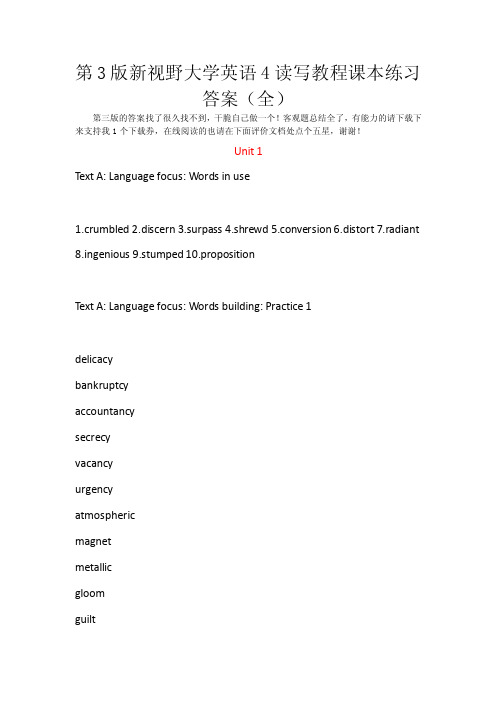
第3版新视野大学英语4读写教程课本练习答案(全)第三版的答案找了很久找不到,干脆自己做一个!客观题总结全了,有能力的请下载下来支持我1个下载券,在线阅读的也请在下面评价文档处点个五星,谢谢!Unit 1Text A: Language focus: Words in use1.crumbled2.discern3.surpass4.shrewd5.conversion6.distort7.radiant8.ingenious9.stumped 10.propositionText A: Language focus: Words building: Practice 1delicacybankruptcyaccountancysecrecyvacancyurgencyatmosphericmagnetmetallicgloomguiltText A: Language focus: Words building: Practice 21.bankruptcies2.atmospheric3.delicacies4.urgency5.accountancy6.gloom7.magnet8.metallic9.mastery 10.vacancy 11.guilt 12.secrecyText A > Language focus > Banked cloze(1)mentioned(2)determine(3)gained(4)responsible(5)heavily(6)artistic(7)(8)analytical(9)distorted(10)stumpedText A > Language focus > Expressions in use1.were dripping with2.in exchange for3.flared up4.make an analogy between5.set a date for6.make ... out of7.made a pact8.had appealed toText B: Reading comprehension: UnderstandingCABDB DCAText B > Language focus > Words in use1.triggering3.hypothesis4.formulate5.threshold6.incidence7.refute8.realm9.decay10.testimonyText B > Language focus > Expressions in use1.play the odds2.subject to3.attributes to4.be factored into5.call for6.By virtue of7.get stuck one into playCollocation: : Practice 1Collocation: : Practice 2Unit 2Text A: Language focus: Words in use1.deficient2.prosecution3.outrage4.appeased5.conformity6.strandplement8.transient9.appliances 10.outfitText A: Language focus: Words building: Practice 1dominationorientationconfrontationcomposerbinderscannermanufacturereraseimperialistleftistterroristhumanistText A: Language focus: Words building: Practice 21.domination2.scanners3.humanist4.confrontation5.leftists6.orientation7.erased8.terrorists9.manufacturers 10.binder 11.imperialists posersText A > Language focus > Banked cloze(1)achieving(2)gorgeous(3)considered(4)context(5)accessories(6)appreciated(7)complexion(8)handsome(9)comment(10)admirationText A > Language focus > Expressions in use1.in hopes of2.came up with3.excused herself4.was obsessed with5.reaching out to6.voice an opinion on7.live up to8.in terms ofText B: Reading comprehension: UnderstandingBDDAD BCAText B > Language focus > Words in use1.hampered2.mortal3.corrode4.preface5.embodies6.interwoven7.knit8.collide9.costume10.predominantText B > Language focus > Expressions in use1.enquired about2.from a ... perspective3.on the rise4.be accountable to5.are worn out6.is exempt from7.approve of8.being addicted toCollocation: : Practice 1Collocation: : Practice 2Unit 3Text A: Language focus: Words in use1.exquisite2.dispersed3.decentralized4.deduce5.fixture6.frugality7.administrate8.disjointed9.Reviving 10.elapseText A: Language focus: Words building: Practice 1punctualitypurityscarcitysenioritysensitivitysolemnityspecialtysuperiorityvalidityvisibilityreassurerestructureText A: Language focus: Words building: Practice 21.seniority2.purity3.specialties4.reassure5. scarcity6.punctuality7.sensitivity8.restructuring9.superiority 10.validity 11.visibility 12.solemnityText A > Language focus > Banked cloze(1)frequently(2)immersed(3)disrupted(4)stress(5)sphere(6)challenges(7)quantifythe pleasure with money. It offers more than (8) financial(9)administrate(10)addictionText A > Language focus > Expressions in use1.held ... in high regard2.In the interim3.was onto something4.in turn5.from time to time6.pick on7.take a stab at8.boil down toText B: Reading comprehension: UnderstandingADCBB ACDText B > Language focus > Words in use1.stimulus2.magnitude3.velocity4.quota5.stipulated6.tease7.eligible8.premium9.reminiscence10.decreeText B > Language focus > Expressions in use1.be embedded in2.a trace of3.is critical to4.adjacent to5.beat sb. down6.remains committed to7.conceive of8. be eligible forCollocation: : Practice 1Collocation: : Practice 2Unit 4Text A: Language focus: Words in use1.consolidate2.differentiate3.dreadful4.incompatible5.alleged6.alleged7.alleged8.alleged9.habitats 10.intelligibleText A: Language focus: Words building: Practice 1harmoniousdisastrousspacioushazardousvirtuousvictoriousdesirousadventurousevenlyroutinelyconsequentrespectivelyText A: Language focus: Words building: Practice 21.victorious2.hazardous3.consequent4.adventurous5.disastrous6.disastrous7.spacious8.respectively9. virtuous10.routinely 11.harmonious 12.desirousText A > Language focus > Banked cloze(1)incompatible (2) preserve biodiversity.(3) available (4) proportion (5)utilized (6) converted (7) dreadful (8) balance (9)sane (10) considerableText A > Language focus > Expressions in use1.took on2.called upon3.runs against the grain4. be incompatiblee through 6.is bound up 7.differentiate between 8.have struck a chord withText B: Reading comprehension: UnderstandingBCCDA ABCText B > Language focus > Words in use1.converge2impaired3contaminate4.vulgar5.dweller6.alienate7.prefer8.injected9.deplore10.invertedText B > Language focus > Expressions in use1.be obedient to2.leaned against3.subscribe to4.preside over5.shutting out6.plunged into7.plunged into8.are disconnected from Collocation: : Practice 1Collocation: : Practice 2Unit 5Text A: Language focus: Words in use1.fabricate2.nominal3.temporal4.reciprocal5.denotes6.consecutive7.spectators8.mutteringposite positeText A: Language focus: Words building: Practice 1assertivedecisivedigestiveimaginativeconsultativequalitativeauthoritativeconservequantitativeunbuttonunsettleunveilText A: Language focus: Words building: Practice 21.conserve2.unbuttoning3.authoritative4.consultative5.imaginative6.quantitative7.unveil8.assertive9.unsettled 10.decisive 11.digestive 12.qualitativeText A > Language focus > Banked cloze(1)exterior (2)insights (3) complete (4)course(5) inconsistencies (6)offended (7)gestures (8) ornaments (9)sense(10) distinctiveText A > Language focus > Expressions in use1.got to the point2.are attached to3.would have starved to death4.If anything5.were suspicious of6.wandered around7.on the side8.was representative ofReading skills > PracticeADBDCText B: Reading comprehension: UnderstandingDACDA CDBText B > Language focus > Words in use1.refund2friction3.mute4.detained5.extractpiles7.convertibles8.mediated9.tactful10.cohesionText B > Language focus > Expressions in usegs behind2.put in charge of3.take a(n) ... approach to4.singled out5.headed for6.incorporated into7.divert … to8. has had an impact onCollocation: : Practice 1Collocation: : Practice 2Unit 6Text A: Language focus: Words in use1.stalked2.stalked3.symmetrical4.lubricated5.twinkled6.mediator7.outposts8.traversing9.emancipate 10.deductiveText A: Language focus: Words building: Practice 1prevalentpersistentcorrespondentrespondentinclusiveindicativeinductiveinteractiveoperativeresponsive / respondentinitiatespeculativeText A: Language focus: Words building: Practice 21.operative2.indicative3.prevalent4.interactive5.speculative6.initiate7.respondents8.inclusive9.persistent 10.inductive 11.responsive 12.correspondentText A > Language focus > Banked cloze(1)reason(2)levy(3)generating(4)lightweight(5)reduction(6)enhance(7)achieved(8)emancipate(9)relationships(10)approachesText A > Language focus > Expressions in use1.being extracted from2.emancipate ... from3.cater to4.have a say on5.made a racket6.was destined to7.run errands8.has scraped byText B: Reading comprehension: UnderstandingDBABC ACDText B > Language focus > Words in use1.transit2.colonized3.execution4.distill5.segregation6.illiterate7.artifacts8.displace9.vigilant10.overthrowText B > Language focus > Expressions in use1.was ejected from2.was ejected from3.forbid ... from4.were coiled up with5.ran for6.against his will7.a ghost of8. took upCollocation: : Practice 1Collocation: : Practice 2Unit 7Text A: Language focus: Words in use1.fringe2.unify3.extinct4.indefinite5.slash6.intricate7.inaugurate8.ventilate9.collaboration 10.diffusedText A: Language focus: Words building: Practice 1competence / competitionadolescentdelegationcondemnationrestorationpreservationspecificationreconciliationresignationspeculationrevelationsituateText A: Language focus: Words building: Practice 21.delegation2.restoration3.situate4.specificationspetence6.adolescent7.condemnation8.reconciliation9.preservation 10.resignation 11. speculation12.revelationText A > Language focus > Banked cloze(1)particulates(2)viable(3)disagree(4)cite(5)rotary(6)vary(7)little(8)minimize(9)locating(10)designedText A > Language focus > Expressions in use1.fill up2.fill up3.have factored in4.pose a risk to5.clear up6.is derived from7.hinge on8.is uponText B: Reading comprehension: UnderstandingDCABB CDAText B > Language focus > Words in use1.intrigued2.neutralize3coherent4.volatile5.disclose6.foretell7.dodge8.intermittent9.wholesale10.dualText B > Language focus > Expressions in use1.level off2.keep ... at bay3.account for4.point to5.are starved of6.ona collision course 7.on a collision course 8. rescued ... from Collocation: : Practice 1Collocation: : Practice 2Unit 8Text A: Language focus: Words in use1.stalked2.expectancy3.terminate4.condolences5.chronicling6.malpractice7.retrospective8.boycott9.incur 10.batchesText A: Language focus: Words building: Practice 1breakagedrainagebriberyrefineryconstitutionalexceptionalinstitutionalorientalsensationtutorialpresidentialprovincialText A: Language focus: Words building: Practice 21.provincial2.breakage3.institutional4.bribery5.sensations6.drainage7.tutorial8.refineries9.oriental 10.constitutional 11.presidential12.exceptionalText A > Language focus > Banked cloze(1) depressing (2)figure (3) flexibility (4) seemingly (5)sued (6) imagine (7) sparked (8) suffering (9) leaflets (10) passionateText A > Language focus > Expressions in use1.stay on the sidelines2.alerted to3.turned upy siege to5.followed suit6.In the face of7.put out8.get revenge forText B: Reading comprehension: UnderstandingCBADD CDBText B > Language focus > Words in use1.vibrate2.indignant3.activate4.adherence5.timely6.patrons7.tentatively8.serial9.denounces10.impetusText B > Language focus > Expressions in use1.has been swamped with2.in adherence to3.in essence4.marvel at5.feel strongly about6.was dubbed…as7.tacking ... upes to lifeCollocation: : Practice 1Collocation: : Practice 2。
大学英语精读第三版第四册第3单元课后习题答案TXT文本电子书.
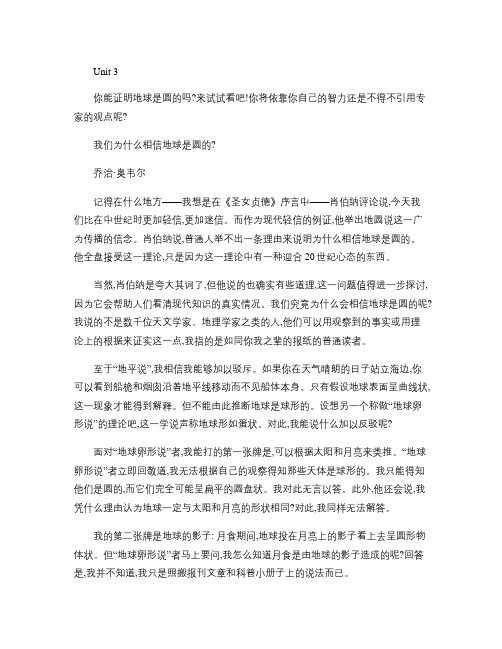
Unit 3你能证明地球是圆的吗?来试试看吧!你将依靠你自己的智力还是不得不引用专家的观点呢?我们为什么相信地球是圆的?乔治·奥韦尔记得在什么地方——我想是在《圣女贞德》序言中——肖伯纳评论说,今天我们比在中世纪时更加轻信,更加迷信。
而作为现代轻信的例证,他举出地圆说这一广为传播的信念。
肖伯纳说,普通人举不出一条理由来说明为什么相信地球是圆的。
他全盘接受这一理论,只是因为这一理论中有一种迎合20世纪心态的东西。
当然,肖伯纳是夸大其词了,但他说的也确实有些道理,这一问题值得进一步探讨,因为它会帮助人们看清现代知识的真实情况。
我们究竟为什么会相信地球是圆的呢?我说的不是数千位天文学家、地理学家之类的人,他们可以用观察到的事实或用理论上的根据来证实这一点,我指的是如同你我之辈的报纸的普通读者。
至于“地平说”,我相信我能够加以驳斥。
如果你在天气晴朗的日子站立海边,你可以看到船桅和烟囱沿着地平线移动而不见船体本身。
只有假设地球表面呈曲线状,这一现象才能得到解释。
但不能由此推断地球是球形的。
设想另一个称做“地球卵形说”的理论吧,这一学说声称地球形如蛋状。
对此,我能说什么加以反驳呢?面对“地球卵形说”者,我能打的第一张牌是,可以根据太阳和月亮来类推。
“地球卵形说”者立即回敬道,我无法根据自己的观察得知那些天体是球形的。
我只能得知他们是圆的,而它们完全可能呈扁平的圆盘状。
我对此无言以答。
此外,他还会说,我凭什么理由认为地球一定与太阳和月亮的形状相同?对此,我同样无法解答。
我的第二张牌是地球的影子: 月食期间,地球投在月亮上的影子看上去呈圆形物体状。
但“地球卵形说”者马上要问,我怎么知道月食是由地球的影子造成的呢?回答是,我并不知道,我只是照搬报刊文章和科普小册子上的说法而已。
小小交锋受挫,于是我打出一张王牌“Q”: 专家的看法。
英国格林威治皇家天文台台长总该是权威了,他告诉我说地球是圆的。
“地球卵形说”者用他的“K”牌压倒我的“Q”牌。
大学所有课后习题答案网址

《新视野大学英语读写教程(第二版)第三册》课后答案/viewthread.php?tid=16&fromuid=191597新视野大学英语读写教程(第二版)第一册》课后答案/viewthread.php?tid=14&fromuid=191597《马·克思主·义基本原理概论》新版完整答案/viewthread.php?tid=37&fromuid=191597《毛·泽东思想和中国特色社会主·义理论体系概论》习题答案(2008年修订版的)/viewthread.php?tid=48&fromuid=19159721世纪大学实用英语综合教程(第一册)课后答案及课文翻译/viewthread.php?tid=4&fromuid=191597西方经济学(高鸿业版)教材详细答案/viewthread.php?tid=60&fromuid=191597《新视野大学英语读写教程(第二版)第二册》课后答案/viewthread.php?tid=15&fromuid=191597思想道德修养与法律基础课后习题答案/viewthread.php?tid=63&fromuid=191597《中国近代史纲要》完整课后答案(高教版)/viewthread.php?tid=81&fromuid=191597《全新版大学英语综合教程》(第三册)练习答案及课文译文/viewthread.php?tid=77&fromuid=191597《全新版大学英语综合教程》(第一册)练习答案及课文译文/viewthread.php?tid=75&fromuid=191597《会计学原理》同步练习题答案/viewthread.php?tid=305&fromuid=191597《微观经济学》课后答案(高鸿业版)/viewthread.php?tid=283&fromuid=191597《统计学》课后答案(第二版,贾俊平版)/viewthread.php?tid=29&fromuid=191597《西方经济学》习题答案(第三版,高鸿业)可直接打印/viewthread.php?tid=289&fromuid=191597毛邓三全部课后思考题答案(高教版)/毛邓三课后答案/viewthread.php?tid=514&fromuid=191597新视野大学英语听说教程1听力原文及答案下载/viewthread.php?tid=2531&fromuid=191597西方宏观经济高鸿业第四版课后答案/viewthread.php?tid=2006&fromuid=191597《管理学》经典笔记(周三多,第二版)/viewthread.php?tid=280&fromuid=191597《中国近代史纲要》课后习题答案/viewthread.php?tid=186&fromuid=191597《理论力学》课后习题答案/viewthread.php?tid=55&fromuid=191597《线性代数》(同济第四版)课后习题答案(完整版)/viewthread.php?tid=17&fromuid=191597高等数学(同济第五版)课后答案(PDF格式,共527页)/viewthread.php?tid=18&fromuid=191597中国近现代史纲要课后题答案/viewthread.php?tid=5900&fromuid=191597曼昆《经济学原理》课后习题解答/viewthread.php?tid=85&fromuid=19159721世纪大学英语读写教程(第三册)参考答案/viewthread.php?tid=5&fromuid=191597谢希仁《计算机网络教程》(第五版)习题参考答案(共48页)/viewthread.php?tid=28&fromuid=191597《概率论与数理统计》习题答案/viewthread.php?tid=57&fromuid=191597《模拟电子技术基础》详细习题答案(童诗白,华成英版,高教版)/viewthread.php?tid=42&fromuid=191597《机械设计》课后习题答案(高教版,第八版,西北工业大学)/viewthread.php?tid=96&fromuid=191597《大学物理》完整习题答案/viewthread.php?tid=217&fromuid=191597《管理学》课后答案(周三多)/viewthread.php?tid=304&fromuid=191597机械设计基础(第五版)习题答案[杨可桢等主编]/viewthread.php?tid=23&fromuid=191597程守洙、江之永主编《普通物理学》(第五版)详细解答及辅导/viewthread.php?tid=3&fromuid=191597新视野大学英语课本详解(四册全)/viewthread.php?tid=1275&fromuid=19159721世纪大学英语读写教程(第四册)课后答案/viewthread.php?tid=7&fromuid=191597新视野大学英语读写教程3册的课后习题答案/viewthread.php?tid=805&fromuid=191597新视野大学英语第四册答案(第二版)/viewthread.php?tid=5310&fromuid=191597《中国近现代史》选择题全集(共含250道题目和答案)/viewthread.php?tid=181&fromuid=191597《电工学》课后习题答案(第六版,上册,秦曾煌主编)/viewthread.php?tid=232&fromuid=191597完整的英文原版曼昆宏观、微观经济学答案/viewthread.php?tid=47&fromuid=191597《数字电子技术基础》习题答案(阎石,第五版)/viewthread.php?tid=90&fromuid=191597《电路》习题答案上(邱关源,第五版)/viewthread.php?tid=137&fromuid=191597《电工学》习题答案(第六版,秦曾煌)/viewthread.php?tid=112&fromuid=19159721世纪大学英语读写教程(第三册)课文翻译/viewthread.php?tid=6&fromuid=191597《生物化学》复习资料大全(3套试卷及答案+各章习题集)/viewthread.php?tid=258&fromuid=191597《模拟电子技术基础》课后习题答案(共10章)/viewthread.php?tid=21&fromuid=191597《概率论与数理统计及其应用》课后答案(浙江大学盛骤谢式千编著)/viewthread.php?tid=178&fromuid=191597《理论力学》课后习题答案(赫桐生,高教版)/viewthread.php?tid=119&fromuid=191597《全新版大学英语综合教程》(第四册)练习答案及课文译文/viewthread.php?tid=78&fromuid=191597《化工原理答案》课后习题答案(高教出版社,王志魁主编,第三版)/viewthread.php?tid=195&fromuid=191597《国际贸易》课后习题答案(海闻P.林德特王新奎)/viewthread.php?tid=290&fromuid=191597大学英语综合教程1-4册练习答案/viewthread.php?tid=1282&fromuid=191597《流体力学》习题答案/viewthread.php?tid=83&fromuid=191597《传热学》课后习题答案(第四版)/viewthread.php?tid=200&fromuid=191597高等数学习题答案及提示/viewthread.php?tid=260&fromuid=191597《高分子化学》课后习题答案(第四版,潘祖仁主编)/viewthread.php?tid=236&fromuid=191597马·克思主·义基本原理概论答案/viewthread.php?tid=6417&fromuid=191597《计算机网络》课后习题解答(谢希仁,第五版)/viewthread.php?tid=3434&fromuid=191597《概率论与数理统计》优秀学习资料/viewthread.php?tid=182&fromuid=191597《离散数学》习题答案(高等教育出版社)/viewthread.php?tid=102&fromuid=191597《模拟电子技术基础简明教程》课后习题答案(杨素行第三版)/viewthread.php?tid=41&fromuid=191597《信号与线性系统分析》习题答案及辅导参考(吴大正版)/viewthread.php?tid=74&fromuid=191597《教育心理学》课后习题答案(皮连生版)/viewthread.php?tid=277&fromuid=191597《理论力学》习题答案(动力学和静力学)/viewthread.php?tid=221&fromuid=191597选修课《中国现当代文学》资料包/viewthread.php?tid=273&fromuid=191597机械设计课程设计——二级斜齿圆柱齿轮减速器(WORD+原图)/viewthread.php?tid=35&fromuid=191597《成本会计》配套习题集参考答案/viewthread.php?tid=300&fromuid=191597《概率论与数理统计》8套习题及习题答案(自学推荐)/viewthread.php?tid=249&fromuid=191597《现代西方经济学(微观经济学)》笔记与课后习题详解(第3版,宋承先)/viewthread.php?tid=294&fromuid=191597《计算机操作系统》习题答案(汤子瀛版,完整版)/viewthread.php?tid=262&fromuid=191597《毛·泽东思想和中国特色社会主·义理论体系概论》有史以来最全面的复习资料!!!/viewthread.php?tid=6423&fromuid=191597《线性代数》9套习题+9套相应答案(自学,复习推荐)/viewthread.php?tid=244&fromuid=191597《管理理论与实务》课后题答案(手写版,中央财经大学,赵丽芬)/viewthread.php?tid=287&fromuid=191597统计学原理作业及参考答案/viewthread.php?tid=13&fromuid=191597机械设计课程设计——带式运输机的传动装置的设计/viewthread.php?tid=222&fromuid=191597《物理学》习题分析与解答(马文蔚主编,清·华大学,第五版)/viewthread.php?tid=50&fromuid=191597《新编大学英语》课后答案(第三册)/viewthread.php?tid=168&fromuid=191597《通信原理》课后习题答案及每章总结(樊昌信,国防工业出版社,第五版)/viewthread.php?tid=203&fromuid=191597《c语言程序与设计》习题答案(谭浩强,第三版)/viewthread.php?tid=59&fromuid=191597《微生物学》课后习题答案(周德庆版)/viewthread.php?tid=291&fromuid=191597新视野第二版全四册听说教程答案/viewthread.php?tid=6959&fromuid=191597《宏观经济学》课后答案(曼昆,中文版)/viewthread.php?tid=138&fromuid=191597《电力电子技术》习题答案(第四版,王兆安,王俊主编)/viewthread.php?tid=164&fromuid=191597《土力学》习题解答/课后答案/viewthread.php?tid=43&fromuid=191597《公司法》课后练习及参考答案/viewthread.php?tid=307&fromuid=191597《全新版大学英语综合教程》(第二册)练习答案及课文译文/viewthread.php?tid=76&fromuid=191597新视野大学英语视听说第三册答案/viewthread.php?tid=5161&fromuid=191597《工程力学》课后习题答案(梅凤翔主编)/viewthread.php?tid=191&fromuid=191597《理论力学》详细习题答案(第六版,哈工大出版社)/viewthread.php?tid=2445&fromuid=191597《成本会计》习题及答案(自学推荐,23页)/viewthread.php?tid=301&fromuid=191597《自动控制原理》课后题答案(胡寿松,第四版)/viewthread.php?tid=52&fromuid=191597《复变函数》习题答案(第四版)/viewthread.php?tid=118&fromuid=191597《信号与系统》习题答案(第四版,吴大正)/viewthread.php?tid=268&fromuid=191597《有机化学》课后答案(第二版,高教版,徐寿昌主编)/viewthread.php?tid=3830&fromuid=191597《电工学——电子技术》习题答案(下册)/viewthread.php?tid=237&fromuid=191597《财务管理学》章后练习参考答案(人大出版,第四版)/viewthread.php?tid=292&fromuid=191597现代汉语题库(语法部分)及答案/viewthread.php?tid=211&fromuid=191597《概率论与数理统计》习题详解(浙大二、三版通用)/viewthread.php?tid=80&fromuid=191597《有机化学》习题答案(汪小兰主编)/viewthread.php?tid=69&fromuid=191597《微机原理及应用》习题答案/viewthread.php?tid=261&fromuid=191597《管理运筹学》第二版习题答案(韩伯棠教授)/viewthread.php?tid=34&fromuid=191597《古代汉语》习题集(附习题答案)福建人民出版社/viewthread.php?tid=1277&fromuid=191597《金融市场学》课后习题答案(张亦春,郑振龙,第二版)/viewthread.php?tid=279&fromuid=191597《公共关系学》习题及参考答案(复习必备)/viewthread.php?tid=308&fromuid=191597现代汉语通论(邵敬敏版)词汇语法课后练习答案/viewthread.php?tid=1429&fromuid=191597《国际经济学》教师手册及课后习题答案(克鲁格曼,第六版)/viewthread.php?tid=281&fromuid=191597《教育技术》课后习题答案参考(北师大)/viewthread.php?tid=199&fromuid=191597《金融市场学》课后答案(郑振龙版)/viewthread.php?tid=24&fromuid=191597《组织行为学》习题集答案(参考下,还是蛮好的)/viewthread.php?tid=297&fromuid=191597《分析化学》课后习题答案(第五版,高教版)/viewthread.php?tid=122&fromuid=191597大学英语精读第3册答案(外教社)/viewthread.php?tid=9&fromuid=191597《国际经济学》习题答案(萨尔瓦多,英文版)/viewthread.php?tid=155&fromuid=191597《复变函数与积分变换》习题答案/viewthread.php?tid=70&fromuid=191597《信息论与编码》辅导PPT及部分习题答案(曹雪虹,张宗橙,北京邮电大学出版社)/viewthread.php?tid=136&fromuid=191597《宏观经济学》习题答案(第七版,多恩布什)/viewthread.php?tid=293&fromuid=191597《物理化学》习题解答(天津大学, 第四版,106张)/viewthread.php?tid=2647&fromuid=191597新视野大学英语视听说教程第一册/viewthread.php?tid=5901&fromuid=191597《机械制造技术》习题集与答案解析/viewthread.php?tid=219&fromuid=191597新视野大学英语听说教程2册听力原文及答案下载/viewthread.php?tid=2532&fromuid=191597管理学试题(附答案)/viewthread.php?tid=1087&fromuid=191597《材料力学》详细辅导及课后答案(PDF格式,共642页)/viewthread.php?tid=31&fromuid=191597六级词汇注解/viewthread.php?tid=4893&fromuid=191597《大学基础物理学》课后答案(共16个单元)/viewthread.php?tid=25&fromuid=191597《管理学——原理与方法》课后习题答案/viewthread.php?tid=303&fromuid=191597新视野2版第三册(大2上学期用)/viewthread.php?tid=1438&fromuid=191597曼昆《经济学原理》中文第四版.课后习题答案-清晰图片版/viewthread.php?tid=1131&fromuid=191597《数据库系统概论》课后习题(第四版)/viewthread.php?tid=240&fromuid=191597大学数学基础教程课后答案(微积分)/viewthread.php?tid=8&fromuid=191597《投资学》课后习题答案(博迪,第四版)/viewthread.php?tid=284&fromuid=191597流体力学课后答案(高教版,张也影,第二版)/viewthread.php?tid=22&fromuid=191597《语言学概论》习题答案(自考,新版教材)/viewthread.php?tid=313&fromuid=191597《统计学》各章练习题答案/viewthread.php?tid=458&fromuid=191597《数字电子技术基础》课后习题答案(完整答案版)/viewthread.php?tid=197&fromuid=191597《积分变换》习题答案(配套东南大学张元林编的)/viewthread.php?tid=103&fromuid=191597《中级财务会计》习题答案(第二版,刘永泽)/viewthread.php?tid=163&fromuid=191597《计算机网络》课后习题答案(第5版和第4版)/viewthread.php?tid=132&fromuid=191597《单片机原理及应用》课后习题答案(张毅刚主编,高教版)/viewthread.php?tid=36&fromuid=191597《金融工程》课后题答案(郑振龙版)/viewthread.php?tid=288&fromuid=191597《液压传动》第2版思考题和习题解答(共36页)/viewthread.php?tid=20&fromuid=191597《动物学》习题集与答案(资料相当丰富)/viewthread.php?tid=315&fromuid=191597《高频电子线路》习题参考答案(第四版)/viewthread.php?tid=142&fromuid=191597《国际经济法》课后参考答案/viewthread.php?tid=306&fromuid=191597大学英语四级十年真题+听力/viewthread.php?tid=2454&fromuid=191597《信号与系统》习题详解(奥本海姆版)/viewthread.php?tid=79&fromuid=191597《电路分析》课后答案及学习指导(第二版,胡翔骏,高教版)/viewthread.php?tid=177&fromuid=191597《C语言设计》(谭浩强,第三版)227页/viewthread.php?tid=129&fromuid=191597新视野大学英语课后习题答案1-4册全集/viewthread.php?tid=7083&fromuid=191597《数字电路与逻辑设计》课后习题答案,讲解详细/viewthread.php?tid=233&fromuid=191597《电路》第五版课后答案/viewthread.php?tid=1678&fromuid=191597《材料力学》详细习题答案及辅导(第四版,刘鸿文)/viewthread.php?tid=88&fromuid=191597《传播学教程》课后答案(郭庆光主编,完整版)/viewthread.php?tid=252&fromuid=191597《物理化学》习题答案与课件集合(南大)/viewthread.php?tid=205&fromuid=191597《金融市场学》电子书(张亦春,郑振龙,第二版)/viewthread.php?tid=278&fromuid=191597毛邓三95%考点/viewthread.php?tid=6802&fromuid=191597高等教育出版社《毛·泽东思想和中国特色社会主·义道路》(09版,原毛邓三)课后题答案/viewthread.php?tid=6874&fromuid=191597《线性代数》课后习题答案(陈维新,科学出版社)/viewthread.php?tid=156&fromuid=191597自动控制原理习题集(自学辅导推荐)/viewthread.php?tid=53&fromuid=191597《现代通信原理》习题答案(曹志刚版)/viewthread.php?tid=44&fromuid=191597高等数学上下《习题PPT》/viewthread.php?tid=66&fromuid=191597《数据结构习题集》答案(C版,清·华大学,严蔚敏)/viewthread.php?tid=173&fromuid=191597《大学物理学》习题解答/viewthread.php?tid=114&fromuid=191597《物理化学》习题答案(南大,第五版)/viewthread.php?tid=143&fromuid=191597《机械原理》复习精要与习题精解(第7版,西北大学)/viewthread.php?tid=179&fromuid=191597《宏观经济学》答案(曼昆,第五版,英文版)pdf格式/viewthread.php?tid=134&fromuid=191597《化工热力学》习题与习题答案(含各种版本)/viewthread.php?tid=235&fromuid=191597《材料力学》习题答案/viewthread.php?tid=230&fromuid=191597教育统计与测量管理心理学(自考必备资料,牛逼打印版)/viewthread.php?tid=264&fromuid=191597离散数学习题解答(第四版)清·华大学出版社/viewthread.php?tid=46&fromuid=191597货币银行学/viewthread.php?tid=5074&fromuid=191597《技术经济学概论》(第二版)习题答案/viewthread.php?tid=109&fromuid=191597《毛·泽东思想和社会主·义建设理论题概论》精炼考试题目,耐心整理/viewthread.php?tid=6062&fromuid=191597《数字信号处理》课后答案及详细辅导(丁美玉,第二版)/viewthread.php?tid=58&fromuid=191597《语言学概论练习题》答案/viewthread.php?tid=312&fromuid=191597《会计电算化》教材习题答案(09年)/viewthread.php?tid=296&fromuid=191597《数据库系统概论》习题答案(第四版)/viewthread.php?tid=86&fromuid=191597《微观经济学》课后答案(平狄克版)/viewthread.php?tid=254&fromuid=191597《控制工程基础》课后习题解答(清·华版)/viewthread.php?tid=127&fromuid=191597《高分子化学》习题答案(第四版)/viewthread.php?tid=144&fromuid=191597《电机与拖动基础》课后习题答案(第四版,机械工业出版社,顾绳谷主编)/viewthread.php?tid=45&fromuid=191597《机械工程测试技术基础》(第三版,熊诗波等主编)课后答案/viewthread.php?tid=27&fromuid=191597《宏观经济学》课后答案(布兰查德版)/viewthread.php?tid=286&fromuid=191597《机械原理》习题答案和超多例题(西北工业大学,第六版)/viewthread.php?tid=239&fromuid=191597《大学物理基础教程》课后习题答案(第二版,等教育出版社)/viewthread.php?tid=172&fromuid=191597简明乐谱基础知识/viewthread.php?tid=762&fromuid=191597《语言学教程》课后答案/viewthread.php?tid=309&fromuid=191597《公司理财》课后答案(英文版,第六版)/viewthread.php?tid=282&fromuid=191597《信息论与编码》学习辅导及习题详解(傅祖芸版)/viewthread.php?tid=238&fromuid=191597《遗传学》课后习题答案(朱军主编,完整版)/viewthread.php?tid=317&fromuid=191597现代人心理实战700题处世韬略/viewthread.php?tid=770&fromuid=191597《自动控制原理》习题答案/viewthread.php?tid=117&fromuid=191597《普通动物学》完整课后答案(刘凌云,郑光美版)/viewthread.php?tid=316&fromuid=191597《微机原理》作业答案(李继灿版)/viewthread.php?tid=218&fromuid=191597尼尔·波兹曼《娱乐至死》/viewthread.php?tid=5129&fromuid=191597《电力电子技术》习题答案(第4版,西安交通大学)/viewthread.php?tid=130&fromuid=191597大学英语四级(CET-4)历年真题大全[89-07年39套](精品级)753页word /viewthread.php?tid=809&fromuid=191597《通信原理》习题答案/viewthread.php?tid=190&fromuid=191597《普通化学(第五版)》习题详解(配套浙大编的)/viewthread.php?tid=94&fromuid=191597经济法课后复习及思考答案/viewthread.php?tid=5406&fromuid=191597《结构化学基础》习题答案(周公度,北大版)/viewthread.php?tid=212&fromuid=191597财务管理学课后答案荆新王化成/viewthread.php?tid=5414&fromuid=191597《C++程序设计》课后习题答案(第2版,吴乃陵,高教版)/viewthread.php?tid=161&fromuid=191597药用植物的两份习题(自己感觉比较有用)/viewthread.php?tid=270&fromuid=191597《数学物理方法》习题解答案详细版(梁昆淼,第二版)/viewthread.php?tid=38&fromuid=191597《机械制图》习题册答案(近机类、非机类,清·华大学出版社)/viewthread.php?tid=158&fromuid=191597《控制工程基础》习题答案(第二版,燕山大学)/viewthread.php?tid=126&fromuid=191597《画法几何》资料包(含习题答案,自学辅导课件)/viewthread.php?tid=216&fromuid=191597《畜禽解剖学与组织胚胎学》习题答案参考/viewthread.php?tid=314&fromuid=191597《统计学》课后习题答案(周恒彤编)/viewthread.php?tid=3022&fromuid=191597《西方经济学简明教程》课后习题全解(尹伯成,上海人民出版社)/viewthread.php?tid=2569&fromuid=191597《汽车理论》课后答案详细解答(余志生,机械工业出版社)/viewthread.php?tid=123&fromuid=191597《数学物理方法》(第三版)习题答案/viewthread.php?tid=101&fromuid=191597新视野听力原文及课后答案/viewthread.php?tid=1401&fromuid=191597新编大学英语4(外研版)课后练习答案/viewthread.php?tid=61&fromuid=191597《材料力学》习题答案(单辉祖,北京航空航天大学)/viewthread.php?tid=187&fromuid=191597大学英语精读第3册课文及课后答案/viewthread.php?tid=1640&fromuid=191597《自动控制原理》课后习题答案———胡寿松,第五版/viewthread.php?tid=1740&fromuid=191597《数据库系统原理与设计》课后答案(第四版,王珊,萨师煊)/viewthread.php?tid=150&fromuid=191597《数字电子技术基础》详细习题答案(阎石第四版)/viewthread.php?tid=167&fromuid=191597财经应用文笔记/viewthread.php?tid=1088&fromuid=191597《管理学》课后习题答案(罗宾斯,人大版,第7版)/viewthread.php?tid=302&fromuid=191597《概率论与数理统计》习题答案(复旦大学出版社)/viewthread.php?tid=82&fromuid=191597《数字信号处理——基于计算机的方法》习题答案(第二版)/viewthread.php?tid=174&fromuid=191597《传热学》课后答案(杨世铭,陶文铨主编,高教版)/viewthread.php?tid=33&fromuid=191597C语言资料大全(有课后答案,自学资料,C程序等)/viewthread.php?tid=170&fromuid=191597毛邓三重点归纳/viewthread.php?tid=6816&fromuid=191597《电力拖动自动控制系统》习题答案/viewthread.php?tid=115&fromuid=191597逄锦聚《政治经济学》(第3版)笔记和课后习题详解/viewthread.php?tid=2185&fromuid=191597《概率论与数理统计》课后习题解答(东南大学出版社)/viewthread.php?tid=206&fromuid=191597《有机化学》课后习题答案(胡宏纹,第三版)/viewthread.php?tid=72&fromuid=191597《常微分方程》习题解答(王高雄版)/viewthread.php?tid=162&fromuid=191597▆▆▆▆▆▆▆▆▆▆▆▆▆▆▆▆▆▆▆▆▆▆▆▆▆▆▆▆▆▆【因为太多了,没办法再粘贴到这里了,更多答案,直接进入下面这个搜索就好】/?fromuid=191597。
新视野大学英语第三版读写4 Unit7 课后3-6-7习题答案
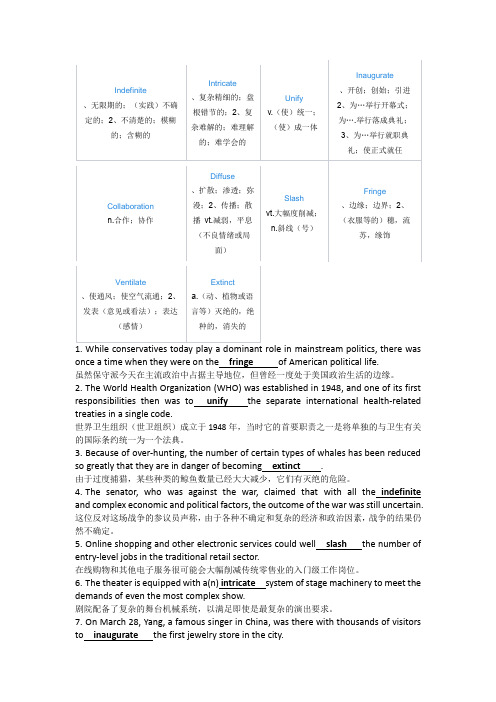
once a time when they were on the fringe of American political life.虽然保守派今天在主流政治中占据主导地位,但曾经一度处于美国政治生活的边缘。
2.The World Health Organization (WHO) was established in 1948, and one of its first responsibilities then was to unify the separate international health-related treaties in a single code.世界卫生组织(世卫组织)成立于1948年,当时它的首要职责之一是将单独的与卫生有关的国际条约统一为一个法典。
3.Because of over-hunting, the number of certain types of whales has been reduced so greatly that they are in danger of becoming extinct .由于过度捕猎,某些种类的鲸鱼数量已经大大减少,它们有灭绝的危险。
4.The senator, who was against the war, claimed that with all the indefinite and complex economic and political factors, the outcome of the war was still uncertain.这位反对这场战争的参议员声称,由于各种不确定和复杂的经济和政治因素,战争的结果仍然不确定。
5.Online shopping and other electronic services could well slash the number of entry-level jobs in the traditional retail sector.在线购物和其他电子服务很可能会大幅削减传统零售业的入门级工作岗位。
新视野大学英语第三版读写4 Unit1 课后3-6-7习题答案

barriers Crumbled ,doctors, or bankers began to increase significantly from the mid-20th century.随着性别壁垒的瓦解,从20世纪中期开始,从事律师、医生或银行家工作的妇女人数开始显著增加。
2.With the data collected each year, the owner of the shop can discern customer trends and how things like weather and economic indicators affect sales performance.通过每年收集的数据,店主可以辨别顾客的趋势,以及天气和经济指标如何影响销售业绩。
3.His supervisor pushes and motivates him in such a positive manner that he is not only able to reach but to surpass his personal goals.他的上司以一种积极的方式推动和激励他,使他不仅能够达到,而且能够超越他的个人目标。
4.He is a man with a(n) shrewd business sense. He has built his initial investment intoa substantial and even excessively large fortune.他是个有精明商业头脑的人。
他把最初的投资变成了一笔可观的、甚至过多的财富。
5.The conversion of nuclear radiation directly into electricity was an exciting possibility that was being vigorously explored in many laboratories in the 1950s.核辐射直接转化为电能是一种令人兴奋的可能性,20世纪50年代,许多实验室正在积极探索这种可能性。
大学体验英语综合教程4(第三版)期末考试练习题

Unit1 1.随着职务的提升,他担负的责任也更大了。
(take on)With his promotion, he has taken on greater responsibilities. 2.他感到没有必要再一次对约翰承担这样的责任了。
(make a commitment)He felt he did not have to make such a commitment to John any more. 3.闲暇时玛丽喜欢外出购物,与她相反,露茜却喜欢待在家里看书。
(as opposed to)Mary likes to go shopping in her spare time, as opposed to Lucy, who prefers to stay at home reading. 4.说得好听一些,可以说他有抱负,用最糟糕的话来说,他是一个没有良心(conscience) 且没有资格的权力追求者。
(at best, at worst)At best he 's ambitious, and at worst a power-seeker without conscience or qualifications. 5.我们已尽全力想说服他,但是却毫无进展。
(strive, make no headway)We have striven to the full to convince him, but we have made no headway. 1. Taxes are a(n)which may fall on everybody. 2. We the authority's decision not to close the hospital.3. The doctor's instructions must be exactly; the sick man's life depends on it.4. Do these opinion polls really what people are thinking?5. I prefer to think of memorization as a stepping-stone to in use of words and phrases. 6. In her office memos she tended to the work done by her staff.7.The history of railroad transport has partly been a history of for greater efficiency and profit.8. He took on the new post without having the faintest idea of what it .9.He is one of the greatest experts in that field.10.Absolute secrecy is essential. , the fewer who are aware of the project the better.Answer: 1. obligation 2. applauded 3. fulfilled 4. mirror 5. flexibility 6. devalue7.striving8. entailed9. supposedly10. Consequently 1. Some people do, and some people do not, believe in of opportunity.2. He bravely a great loss from the death of his father. 3. Police have still found no as to the whereabouts of the missing woman.4. In designing a bridge, one must allow for in hot weather.5. One of the workmen was for his always being drunk.6. When boundaries between countries are not clearly, there is usually trouble.7. Gardening is outside the of my activities.8. She said that the hat made me look silly, but perhaps that was grapes.9. The newspapers are full of such news nowadays as crime, natural disasters, and rising prices.10.The of the world into developed and underdeveloped nations is a gross simplification.Answer: 1. equality 2. sustained 3. clue 4. expansiveness 5. sacked 6. defined7.sphere8. sour9. depressing10. division Unit2 1.宪法规定公民享有言论自由。
新视野大学英语4(第三版)读写教程课后习题答案

Text AText A: Language focus: Words in usecrumb1eddi scernsurpassshrewdconversiondistortradi antingeni ousstumpedproposi tionText A: Language focus: Word bui1ding: Practice delicacybankruptcyaccountancysecrecyvacancyurgencyatmosphericmagnetmetal1icg100guiltmasteryText A: Language focus: Word building: Practice bankruptciesatmosphericdelicaciesurgencyaccountancyg1oommagnetmetallicmasteryvacancygui1tsecrecyText A: Language focus: Banked clozementi oneddeterminegainedresponsibleartisticopposi teanalyticaldistortedstumpedText A: Language focus: Expressions in usewere dripping wi thin exchange forf1ared upmake an analogy betweenset a date formake...out ofmade a pacthad appea1ed toText AiTranslation: Task 1亚里士多德是古希腊的哲学家和科学家。
他的作品涵盖了许多学科,包括物理学、生物学、动物学、逻辑学、伦理学、诗歌、戏剧、音乐、语言学、政治和政府,松成了第一个综合的西方哲学体系。
亚里士多德是第一个将人类的知识领域划分为不同学科的人,如数学,生物学和伦理学。
大工10春《大学英语4》辅导资料三

大学英语4辅导资料三主题:Unit 1 课后部分习题的答案与讲解学习时间:2010年5月3日-5月9日内容:Exercise 1 Fill in the blanks with words or expressions chosen form the following list. Change the form where necessary.marvelous delivery cash thoughtfulpain echo odd sourrange stack shrink cut intoleisurely done with settle for for rent competitive draw one’s attention to make a dent in might as well1. A thoughtful person thinks before speaking and considers the feelings of others.(一个体贴的人往往先思考后说话,并且考虑别人的感受。
)2.The library is closing. We might as well go home.(图书馆关门了。
我们不如回家去。
)3.I’d like to draw your attention to the fact that there is some sense after all in thespeaker’s nonsense.(我想让你注意这个事实,说话者的胡言乱语不是没有一点意义的。
)4.Harry has a vivid imagination; he can make up marvelous stories.(哈利想像力丰富,他能编出奇妙的故事。
)5.Although Margie was swimming so well, she failed to win the first prize and hadto settle for the second.(玛吉尽管游泳游得很好,但却没能得第一,屈居第二。
新视野大学英语第三版读写4 Unit6 课后3-6-7习题答案
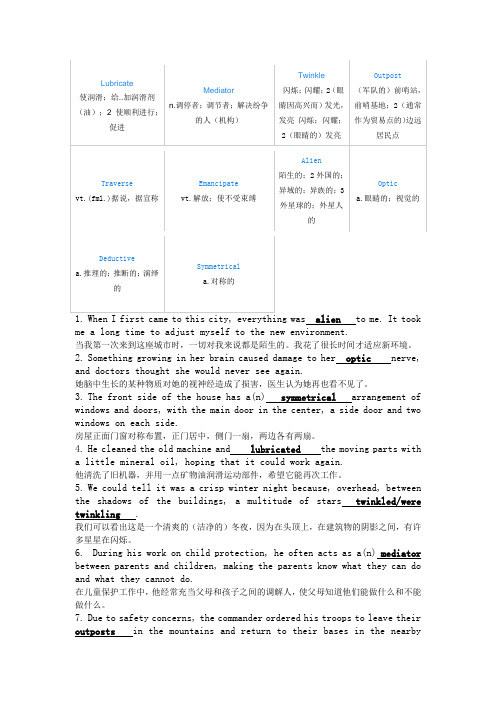
was alien tome a long time to adjust myself to the new environment.当我第一次来到这座城市时,一切对我来说都是陌生的。
我花了很长时间才适应新环境。
2.Something growing in her brain caused damage to her optic nerve, and doctors thought she would never see again.她脑中生长的某种物质对她的视神经造成了损害,医生认为她再也看不见了。
3.The front side of the house has a(n) symmetrical arrangement of windows and doors, with the main door in the center, a side door and two windows on each side.房屋正面门窗对称布置,正门居中,侧门一扇,两边各有两扇。
4.He cleaned the old machine and lubricated the moving parts witha little mineral oil, hoping that it could work again.他清洗了旧机器,并用一点矿物油润滑运动部件,希望它能再次工作。
5.We could tell it was a crisp winter night because, overhead, between the shadows of the buildings, a multitude of stars twinkled/were twinkling .我们可以看出这是一个清爽的(洁净的)冬夜,因为在头顶上,在建筑物的阴影之间,有许多星星在闪烁。
6. During his work on child protection, he often acts as a(n) mediator between parents and children, making the parents know what they can do and what they cannot do.在儿童保护工作中,他经常充当父母和孩子之间的调解人,使父母知道他们能做什么和不能做什么。
大学教材课后习题答案大全
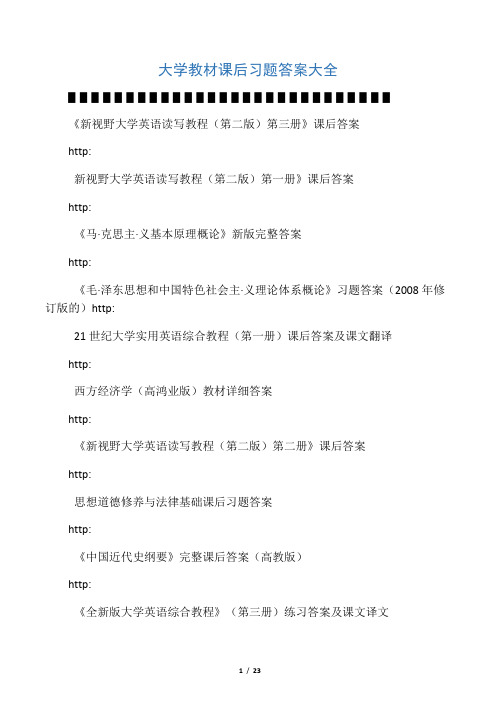
大学教材课后习题答案大全▆▆▆▆▆▆▆▆▆▆▆▆▆▆▆▆▆▆▆▆▆▆▆▆▆▆▆▆《新视野大学英语读写教程(第二版)第三册》课后答案http:新视野大学英语读写教程(第二版)第一册》课后答案http:《马·克思主·义基本原理概论》新版完整答案http:《毛·泽东思想和中国特色社会主·义理论体系概论》习题答案(2008年修订版的)http:21世纪大学实用英语综合教程(第一册)课后答案及课文翻译http:西方经济学(高鸿业版)教材详细答案http:《新视野大学英语读写教程(第二版)第二册》课后答案http:思想道德修养与法律基础课后习题答案http:《中国近代史纲要》完整课后答案(高教版)http:《全新版大学英语综合教程》(第三册)练习答案及课文译文http:《全新版大学英语综合教程》(第一册)练习答案及课文译文http:《会计学原理》同步练习题答案http:《微观经济学》课后答案(高鸿业版)http:《统计学》课后答案(第二版,贾俊平版)http:《西方经济学》习题答案(第三版,高鸿业)可直接打印http:毛邓三全部课后思考题答案(高教版)/毛邓三课后答案http:新视野大学英语听说教程1听力原文及答案下载http:西方宏观经济高鸿业第四版课后答案http:《管理学》经典笔记(周三多,第二版)http:《中国近代史纲要》课后习题答案http:《理论力学》课后习题答案http:《线性代数》(同济第四版)课后习题答案(完整版)http:高等数学(同济第五版)课后答案(PDF格式,共527页)http:中国近现代史纲要课后题答案http:曼昆《经济学原理》课后习题解答http:21世纪大学英语读写教程(第三册)参考答案http:谢希仁《计算机网络教程》(第五版)习题参考答案(共48页)http:《概率论与数理统计》习题答案http:《模拟电子技术基础》详细习题答案(童诗白,华成英版,高教版)http:《机械设计》课后习题答案(高教版,第八版,西北工业大学)http:《大学物理》完整习题答案http:《管理学》课后答案(周三多)http:机械设计基础(第五版)习题答案[杨可桢等主编]http:程守洙、江之永主编《普通物理学》(第五版)详细解答及辅导http:新视野大学英语课本详解(四册全)http:21世纪大学英语读写教程(第四册)课后答案http:新视野大学英语读写教程3册的课后习题答案http:新视野大学英语第四册答案(第二版)http:《中国近现代史》选择题全集(共含250道题目和答案)http:《电工学》课后习题答案(第六版,上册,秦曾煌主编)http:完整的英文原版曼昆宏观、微观经济学答案http:《数字电子技术基础》习题答案(阎石,第五版)http:《电路》习题答案上(邱关源,第五版)http:《电工学》习题答案(第六版,秦曾煌)http:21世纪大学英语读写教程(第三册)课文翻译http:《生物化学》复习资料大全(3套试卷及答案+各章习题集)http:《模拟电子技术基础》课后习题答案(共10章)http:《概率论与数理统计及其应用》课后答案(浙江大学盛骤谢式千编著)http:《理论力学》课后习题答案(赫桐生,高教版)http:《全新版大学英语综合教程》(第四册)练习答案及课文译文http:《化工原理答案》课后习题答案(高教出版社,王志魁主编,第三版)http:《国际贸易》课后习题答案(海闻P.林德特王新奎)http:大学英语综合教程1-4册练习答案http:《流体力学》习题答案http:《传热学》课后习题答案(第四版)http:高等数学习题答案及提示http:《高分子化学》课后习题答案(第四版,潘祖仁主编)http:马·克思主·义基本原理概论答案http:《计算机网络》课后习题解答(谢希仁,第五版)http:《概率论与数理统计》优秀学习资料http:《离散数学》习题答案(高等教育出版社)http:《模拟电子技术基础简明教程》课后习题答案(杨素行第三版)http:《信号与线性系统分析》习题答案及辅导参考(吴大正版)http:《教育心理学》课后习题答案(皮连生版)http:《理论力学》习题答案(动力学和静力学)http:选修课《中国现当代文学》资料包http:机械设计课程设计——二级斜齿圆柱齿轮减速器(WORD+原图)http:《成本会计》配套习题集参考答案http:《概率论与数理统计》8套习题及习题答案(自学推荐)http:《现代西方经济学(微观经济学)》笔记与课后习题详解(第3版,宋承先)http:《计算机操作系统》习题答案(汤子瀛版,完整版)http:《毛·泽东思想和中国特色社会主·义理论体系概论》有史以来最全面的复习资料!!!http:《线性代数》9套习题+9套相应答案(自学,复习推荐)http:《管理理论与实务》课后题答案(手写版,中央财经大学,赵丽芬)http:统计学原理作业及参考答案http:机械设计课程设计——带式运输机的传动装置的设计http:《物理学》习题分析与解答(马文蔚主编,清·华大学,第五版)http:《新编大学英语》课后答案(第三册)http:《通信原理》课后习题答案及每章总结(樊昌信,国防工业出版社,第五版)http:《c语言程序与设计》习题答案(谭浩强,第三版)http:《微生物学》课后习题答案(周德庆版)http:新视野第二版全四册听说教程答案http:《宏观经济学》课后答案(曼昆,中文版)http:《电力电子技术》习题答案(第四版,王兆安,王俊主编)http:《土力学》习题解答/课后答案http:《公司法》课后练习及参考答案http:《全新版大学英语综合教程》(第二册)练习答案及课文译文http:新视野大学英语视听说第三册答案http:《工程力学》课后习题答案(梅凤翔主编)http:《理论力学》详细习题答案(第六版,哈工大出版社)http:《成本会计》习题及答案(自学推荐,23页)http:《自动控制原理》课后题答案(胡寿松,第四版)http:《复变函数》习题答案(第四版)http:《信号与系统》习题答案(第四版,吴大正)http:《有机化学》课后答案(第二版,高教版,徐寿昌主编)http:《电工学——电子技术》习题答案(下册)http:《财务管理学》章后练习参考答案(人大出版,第四版)http:现代汉语题库(语法部分)及答案http:《概率论与数理统计》习题详解(浙大二、"三版通用)http:《有机化学》习题答案(汪小兰主编)http:《微机原理及应用》习题答案http:《管理运筹学》第二版习题答案(韩伯棠教授)http:《古代汉语》习题集(附习题答案)福建人民出版社http:《金融市场学》课后习题答案(张亦春,郑振龙,第二版)http:《公共关系学》习题及参考答案(复习必备)http:现代汉语通论(邵敬敏版)词汇语法课后练习答案http:《国际经济学》教师手册及课后习题答案(克鲁格曼,第六版)http:《教育技术》课后习题答案参考(北师大)http:《金融市场学》课后答案(郑振龙版)http:《组织行为学》习题集答案(参考下,还是蛮好的)http:《分析化学》课后习题答案(第五版,高教版)http:大学英语精读第3册答案(外教社)http:《国际经济学》习题答案(萨尔瓦多,英文版)http:《复变函数与积分变换》习题答案http:《信息论与编码》辅导PPT及部分习题答案(曹雪虹,张宗橙,北京邮电大学出版社)http:《宏观经济学》习题答案(第七版,多恩布什)http:《物理化学》习题解答(天津大学,第四版,106张)http:新视野大学英语视听说教程第一册http:《机械制造技术》习题集与答案解析http:新视野大学英语听说教程2册听力原文及答案下载http:管理学试题(附答案)http:《材料力学》详细辅导及课后答案(PDF格式,共642页)http:六级词汇注解http:《大学基础物理学》课后答案(共16个单元)http:《管理学——原理与方法》课后习题答案http:新视野2版第三册(大2上学期用)http:曼昆《经济学原理》中文第四版.课后习题答案-清晰图片版http:《数据库系统概论》课后习题(第四版)http:大学数学基础教程课后答案(微积分)http:《投资学》课后习题答案(博迪,第四版)http:流体力学课后答案(高教版,张也影,第二版)http:《语言学概论》习题答案(自考,新版教材)http:《统计学》各章练习题答案http:《数字电子技术基础》课后习题答案(完整答案版)http:《积分变换》习题答案(配套东南大学张元林编的)http:《中级财务会计》习题答案(第二版,刘永泽)http:《计算机网络》课后习题答案(第5版和第4版)http:《单片机原理及应用》课后习题答案(张毅刚主编,高教版)http:《金融工程》课后题答案(郑振龙版)http:《液压传动》第2版思考题和习题解答(共36页)http:《动物学》习题集与答案(资料相当丰富)http:《高频电子线路》习题参考答案(第四版)http:《国际经济法》课后参考答案http:大学英语四级十年真题+听力http:《信号与系统》习题详解(奥本海姆版)http:《电路分析》课后答案及学习指导(第二版,胡翔骏,高教版)http:《C语言设计》(谭浩强,第三版)227页http:新视野大学英语课后习题答案1-4册全集http:《数字电路与逻辑设计》课后习题答案,讲解详细http:《电路》第五版课后答案http:《材料力学》详细习题答案及辅导(第四版,刘鸿文)http:《传播学教程》课后答案(郭庆光主编,完整版)http:《物理化学》习题答案与课件集合(南大)http:《金融市场学》电子书(张亦春,郑振龙,第二版)http:毛邓三95%考点http:高等教育出版社《毛·泽东思想和中国特色社会主·义道路》(09版,原毛邓三)课后题答案http:《线性代数》课后习题答案(陈维新,科学出版社)http:自动控制原理习题集(自学辅导推荐)http:《现代通信原理》习题答案(曹志刚版)http:高等数学上下《习题PPT》http:《数据结构习题集》答案(C版,清·华大学,严蔚敏)http:《大学物理学》习题解答http:《物理化学》习题答案(南大,第五版)http:《机械原理》复习精要与习题精解(第7版,西北大学)http:《宏观经济学》答案(曼昆,第五版,英文版)pdf格式http:《化工热力学》习题与习题答案(含各种版本)http:《材料力学》习题答案http:教育统计与测量管理心理学(自考必备资料,牛逼打印版)http:离散数学习题解答(第四版)清·华大学出版社http:货币银行学http:《技术经济学概论》(第二版)习题答案http:《毛·泽东思想和社会主·义建设理论题概论》精炼考试题目,耐心整理http:《数字信号处理》课后答案及详细辅导(丁美玉,第二版)http:《语言学概论练习题》答案http:《会计电算化》教材习题答案(09年)http:《数据库系统概论》习题答案(第四版)http:《微观经济学》课后答案(平狄克版)http:《控制工程基础》课后习题解答(清·华版)http:《高分子化学》习题答案(第四版)http:《电机与拖动基础》课后习题答案(第四版,机械工业出版社,顾绳谷主编)http:《机械工程测试技术基础》(第三版,熊诗波等主编)课后答案http:《宏观经济学》课后答案(布兰查德版)http:《机械原理》习题答案和超多例题(西北工业大学,第六版)http:《大学物理基础教程》课后习题答案(第二版,等教育出版社)http:简明乐谱基础知识http:《语言学教程》课后答案http:《公司理财》课后答案(英文版,第六版)http:《信息论与编码》学习辅导及习题详解(傅祖芸版)http:《遗传学》课后习题答案(朱军主编,完整版)http:现代人心理实战700题处世韬略http:《自动控制原理》习题答案http:《普通动物学》完整课后答案(刘凌云,郑光美版)http:《微机原理》作业答案(李继灿版)http:尼尔·波兹曼《娱乐至死》http:《电力电子技术》习题答案(第4版,西安交通大学)http:大学英语四级(CET-4)历年真题大全[89-07年39套](精品级)753页wordhttp:《通信原理》习题答案http:《普通化学(第五版)》习题详解(配套浙大编的)http:经济法课后复习及思考答案http:《结构化学基础》习题答案(周公度,北大版)http:财务管理学课后答案荆新王化成http:《C++程序设计》课后习题答案(第2版,吴乃陵,高教版)http:药用植物的两份习题(自己感觉比较有用)http:《数学物理方法》习题解答案详细版(梁昆淼,第二版)http:《机械制图》习题册答案(近机类、非机类,清·华大学出版社)http:《控制工程基础》习题答案(第二版,燕山大学)http:《画法几何》资料包(含习题答案,自学辅导课件)http:《畜禽解剖学与组织胚胎学》习题答案参考http:《统计学》课后习题答案(周恒彤编)http:《西方经济学简明教程》课后习题全解(尹伯成,上海人民出版社)http:《汽车理论》课后答案详细解答(余志生,机械工业出版社)http:《数学物理方法》(第三版)习题答案http:新视野听力原文及课后答案http:新编大学英语4(外研版)课后练习答案http:《材料力学》习题答案(单辉祖,北京航空航天大学)http:大学英语精读第3册课文及课后答案http:《自动控制原理》课后习题答案———胡寿松,第五版http:《数据库系统原理与设计》课后答案(第四版,王珊,萨师煊)http:《数字电子技术基础》详细习题答案(阎石第四版)http:财经应用文笔记http:《管理学》课后习题答案(罗宾斯,人大版,第7版)http:《概率论与数理统计》习题答案(复旦大学出版社)http:《数字信号处理——基于计算机的方法》习题答案(第二版)http:《传热学》课后答案(杨世铭,陶文铨主编,高教版)http:C语言资料大全(有课后答案,自学资料,C程序等)http:毛邓三重点归纳http:《电力拖动自动控制系统》习题答案http:逄锦聚《政治经济学》(第3版)笔记和课后习题详解http:《概率论与数理统计》课后习题解答(东南大学出版社)http:《有机化学》课后习题答案(胡宏纹,第三版)http:《常微分方程》习题解答(王高雄版)http:▆▆▆▆▆▆▆▆▆▆▆▆▆▆▆▆▆▆▆▆▆▆▆▆▆▆▆▆▆▆【因为太多了,没办法再粘贴到这里了,更多答案,直接进入下面这个搜索就好】http:。
《大学英语三》习题三答案
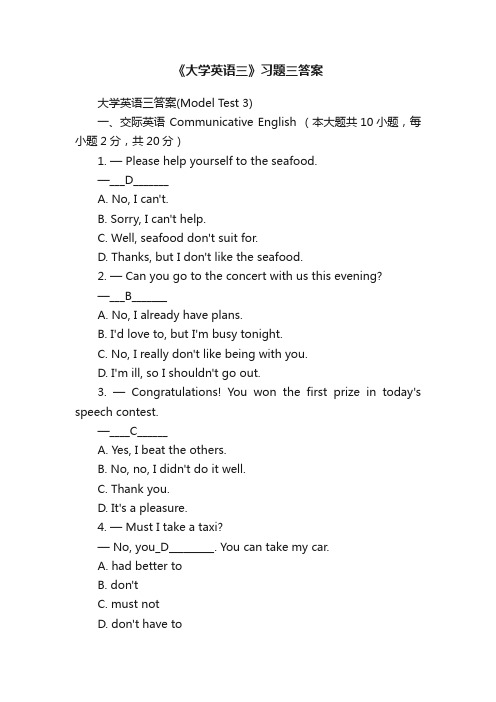
《大学英语三》习题三答案大学英语三答案(Model Test 3)一、交际英语 Communicative English (本大题共10小题,每小题2分,共20分)1. — Please help yourself to the seafood.—___D_______A. No, I can't.B. Sorry, I can't help.C. Well, seafood don't suit for.D. Thanks, but I don't like the seafood.2. — Can you go to the concert with us this evening?—___B_______A. No, I already have plans.B. I'd love to, but I'm busy tonight.C. No, I really don't like being with you.D. I'm ill, so I shouldn't go out.3. —Congratulations! You won the first prize in today's speech contest.—____C______A. Yes, I beat the others.B. No, no, I didn't do it well.C. Thank you.D. It's a pleasure.4. — Must I take a taxi?— No, you_D_________. You can take my car.A. had better toB. don'tC. must notD. don't have to5. — We are going to have a singing party tonight. Would you like to join us?—____A______A. I'm afraid not, because I have to go to an important meeting.B. Of course not. I have no idea.C. No, I can't.D. That's all set.6. — May I use your bike for a moment?— CA. It's well.B. It doesn't matter.C. By all means.D. I have no idea.7. — How do you do? Glad to meet you.— BA. Fine. How are you?B. How do you do? Glad to meet you, too.C. How are you? Thank you!D. Nice. How are you?8. — Hi, is Mary there, please?— AA. Hold on. I'll get her.B. No, she isn't here.C. Yes, she lives here.D. Yes, what do you want?9. — Would you mind changing seats with me?— CA. Yes, you can.B. Of course, I like to.C. No, I don't mind.D. Certainly, please do.10. — Shall we sit up here on the grass or down there near the water?— AA. I'd rather stay here if you don't mind.B. Sorry, I don't like neither.C. Certainly, why not?D. Yes, we like these two places.二、词汇语法Vocabulary and Grammar(本大题共15小题,每小题2分,共30分)11. It is said that B boys in your school like playing football in their spare time, thoughothers prefer basketball.A. quite a lotB. quite a fewC. quite a bitD. quite a little12. —W hat’s his mother like?— D .A. She's very happyB. She's at homeC. She likes watching TVD. She's tall and thin13. The new order means D overtime.A. worksB. workedC. to workD. working14. She has two best friends. D of them is in the country.A. AllB. BothC. No oneD. Neither15. I was giving a talk to a large group of people, the same talk I C to half a dozen othergroups before.A. was givingB. am givingC. had givenD. have given16. The manager will not ____D_____ us to use his car.A. haveB. letC. agreeD. allow17. ___D______ her and then try to copy what she does.A. MindB. SeeC. Stare atD. Watch18. Will you ___A______me a favor, please?A. doB. makeC. bringD. give19. It's bad A for you to smoke in the public places where smoking is not allowed.A. behaviorB. actionC. mannerD. movement20. — It's a good idea. But who's going to ___A______ the plan?— I think John and Peter will.A. carry outB. get throughC. take inD. set aside21. Before the final examination, some students have shown __C____of tension. They even have troublein sleeping.A. anxietyB. marksC. signsD. remarks22. The problem is not C so easy as you think. It's far from being settled.A. hardlyB. almostC. nearlyD. scarcely23. — It's time to tidy your room, Harry!—See the tidy room, Mum! ___C______ is where it should be.A. SomethingB. AnythingC. EverythingD. Nothing24. —What will you buy for your boyfriend's birthday?—I want to buy a _______B____wallet for him.A. black leather smallB. small black leatherC. small leather blackD. black small leather25. The young actor who had been thought highly of ____B____ to be a great disappointment.A. turned upB. turned outC. turned downD. turned in三、阅读理解 Reading Comprehension本大题共15小题,每小题2分,共30分Passage 1How men first learnt to invent words is unknown; in other words, the origin of language is a mystery. All we really know is that men, unlike animals, somehow invented certain sounds to express thought and feelings, actions and things, so that they could communicate with each other; and that later they agreed upon certain signs, called letters, which could be combined to present those sounds, and which could be written down. Those sounds, whether spoken or written in letters, we call words.The power of words, then, lies in their associations—the things they bring up before our minds. Words become filled with meaning for us by experience; and the longer we live, the more certain words recall to us the glad and sad events of our past; and the more we read and learn, the more the number of words that mean something increases.Great writers are those who not only have great thoughts but also express these thoughts in words which appeal powerfully to our minds and emotions. This charming and telling use of words is what we call literary style. Above all, the real poet is a master of words. He can convey his meaning in words which sing likemusic and which by their position and association can move men to tears. We should therefore learn to choose our words carefully and use them accurately, or they will make our speech silly and vulgar. (239 words)26. The origin of language is D .A. a legend handed down from the pastB. a matter that is hidden or secretC. a question difficult to answerD. a problem not yet solved27. What is true about words?CA. They are used to express feelings only.B. They can not be written down.C. They are simply sounds.D. They are mysterious.28. The real power of words lies in their D .A. propertiesB. characteristicsC. peculiarityD. representative function29. By "association", the author means B .A. a special qualityB. a joining of ideas in the mindC. an appearance which is puzzlingD. a strange feature30. Which of the following statements about the real poet is NOT true?AA. He is no more than a master of words.B. He can convey his ideas in words which sing like music.C. He can move men to tears.D. His style is always charming.Passage 2Many people who work in London prefer to live outside it, and to go in to their offices or schools every day by train, car or bus, even though this means they have to get up early in the morning and reach home late in the evening.One advantage of living outside London is that houses are cheaper. Even a small flat in London without a garden costs quite a lot to rent. With the same money, one can get a little house in the country with a garden of one's own.Then, in the country one can really get away from the noise and hurry of busy working lives. Even though one has to get up earlier and spend more time in trains or buses, one can sleep better at night and during weekends and on summer evenings, one can enjoy the fresh, clean air of the country. If one likes gardens, one can spend one's free time digging, planting, watering and doing the hundred and one other jobs which are needed in a garden. Then, when the flowers and vegetables come up, one has got the reward together with those who have shared the secret of Nature.Some people, however, take no interest in country things: for them, happiness lies in the town, with its cinemas and theaters, beautiful shops and busy streets, dance-halls and restaurants. Such people would feel that their life was not worth living if they had to live it outside London. An occasional walk in one of the parks and a fortnight's (two weeks) visit to the sea every summer is all the country they want: the rest they are quite prepared to leave to those who are glad to get away from London every night. (287 words)31. Which of the following statements is NOT true?BA. People who love Nature prefer to live outside the city.B. All the people who work in London prefer to live in the country.C. Some people enjoying city life prefer to work and live inside London.D. Many nature lovers, though working in London, prefer to live outside the city.32. With the same money needed for C , one can buy a little house with a garden in thecountry.A. getting a small flat with a gardenB. having a small flat with a gardenC. renting a small flat without a gardenD. buying a small flat without a garden33. When the garden is in blossom, the one B has been rewarded.A. living in the countryB. having spent time working in the gardenC. having a garden of his ownD. having been digging, planting and watering34. People who think happiness lies in the city life would feel that A if they had to live outside London.A. their life was meaninglessB. their life was invaluableC. they didn't deserve a happy lifeD. they were not worthy of their happy life35. The underlined phrase get away from in the 3rd paragraph refers to C .A. deal withB. do away withC. escape fromD. prevent fromPassage 3By definition, heroes and heroines are men and women distinguished by uncommon courage, achievements, and self-sacrifice made most for the benefits of others----they are people against whom we measure others. They are men and women recognized for shaping our nation's consciousness and development as well as the lives of those who admire them. Yet, some people say that ours is an age where true heroes and heroines are hard to come by, where the very idea of heroism is something beyond us----an artifact of the past. Some maintain, that because the Cold War is over and because America is at peace, our age is essentially an unheroic one. Furthermore, the overall crime rate is down, poverty has been eased by a strong and growing economy, and advances continue to be made in medical science.Cultural icons are hard to define, but we know them when we see them. They are people who manage to go beyond celebrity (明星) , who are legendary, who somehow manage to become mythic. But what makes some figures icons and others mere celebrities? That's hard to answer. In part, their lives have the quality of a story to tell. For instance, the beautiful young Diana Spencer who at 19 married a prince, renounced marriage and the throne, and died at the moment she found true love. Good looks certainly help. So does a special indefinable charm, with the help of the media. But nothing confirms an icon more than a tragic death----such as Martin Luther King, Jr., John F. Kennedy, and Princess Diana. (258 words)36. The passage mainly deals with C .A. life and deathB. heroes and heroinesC. heroes and iconsD. icons and celebrities37. Heroes and heroines are usually D .A. courageousB. good examples to followC. self-sacrificingD. all of the above38. Which of the following statements is wrong?DA. Poverty in America has been eased with the economic growth.B. Superstars are famous for being famous.C. One's look can contribute to being famous.D. Heroes and heroines can only emerge in war times.39. Beautiful young Diana Spencer found her genuine love C .A. when she was 19B. when she became a princessC. just before her deathD. after she gave birth to a prince40. What is more likely to set an icon's status?BA. Good looks.B. Tragic and early death.C. Personal attraction.D. The quality of one's story.四、完形填空 Cloze(本大题共10小题,每小题1分,共10分)Did you sleep well last night? Maybe many people will answer: No. In fact, in the world about one in three people do not have good sleep. 41 you say you do not have good sleep, it means waking early and not getting back to sleep, often interrupted short period of sleep, or hours of wakefulness. You42 get tired, worried, and anxious. Your memory and ability to remember things will be 43 .Then what should you do when you have the trouble? Do not worry about it too much. First, let's see whether you can sleep yourself. The ways are as follows:First, 44 that your bedroom isn't too cold or too hot. Keep it dark and quiet.Second, check your lifestyle:Do not drink tea, coffee, cola or chocolate four hours before 45 .Drink less liquid so that you canhave no or fewer visits to the toilet.Set your body clock well by getting up and going to bed at the fixed time every day. You 46 take any daytime naps.Develop a relaxing bedtime habit. Read or 47 music, then take a warm bath. If you really can not sleep, try some bread, rice 48 milk. They will help you fall asleep.Go for a daily walk. Natural light helps you to put your body clock into correct habit, 49 do exercise outdoors if you can.Forget the worries of the day. Write down any worries, thoughts or questions before you go to bed. With these written down, you will have 50 to think about and your sleep will become easier.C41. A. When B. In case C. If D. AsB42. A. might B. may C. must D. shouldA43 A affected B. damaged C. destroyed D. endangeredB44. A. determined B. make sure C. watch out D. look intoC45. A. sleeping B. going to sleep C. going to bed D. falling asleepD46. A. won't B. wouldn't better C. had better D. had better notA47. A. listen to B. listen C. hear D. seeB48. A. and B. or C. with D. onC49. A. neither B. but C. so D. howeverD50. A. harder B. fewer C. more D. less五、作文 Essay Writing(本大题共10分)You are required to write a letter to one of your friends who invited you to his/her birthday party. You should write at least 80 words, and base your letter on the Chinese outline below:1. 告诉对方你不能接受他/她的邀请;2. 对对方的邀请表示感谢;3. 说明无法接受邀请的原因。
新视野大学英语第三版读写4 Unit3 课后3-6-7习题答案
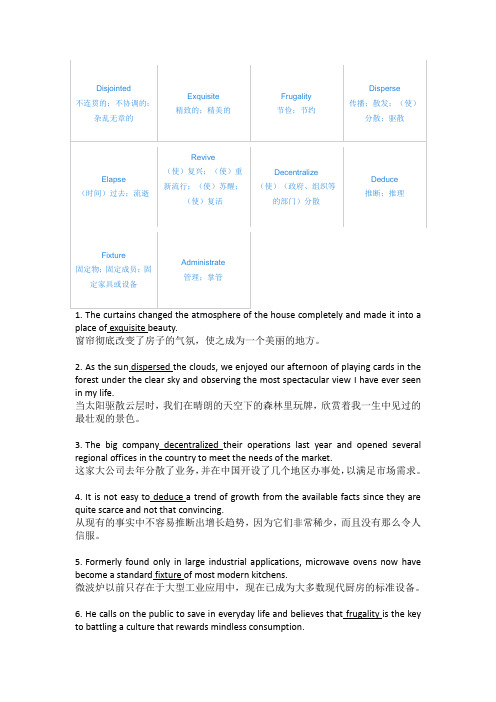
place of exquisite beauty.窗帘彻底改变了房子的气氛,使之成为一个美丽的地方。
2.As the sun dispersed the clouds, we enjoyed our afternoon of playing cards in the forest under the clear sky and observing the most spectacular view I have ever seen in my life.当太阳驱散云层时,我们在晴朗的天空下的森林里玩牌,欣赏着我一生中见过的最壮观的景色。
3.The big company decentralized their operations last year and opened several regional offices in the country to meet the needs of the market.这家大公司去年分散了业务,并在中国开设了几个地区办事处,以满足市场需求。
4.It is not easy to deduce a trend of growth from the available facts since they are quite scarce and not that convincing.从现有的事实中不容易推断出增长趋势,因为它们非常稀少,而且没有那么令人信服。
5.Formerly found only in large industrial applications, microwave ovens now have become a standard fixture of most modern kitchens.微波炉以前只存在于大型工业应用中,现在已成为大多数现代厨房的标准设备。
6.He calls on the public to save in everyday life and believes that frugality is the key to battling a culture that rewards mindless consumption.他呼吁公众在日常生活中储蓄,并认为节俭是与奖励无意识消费的文化作斗争的关键。
英语专业版英语教程四第三单元课后习题及答案 Microsoft Word 文档
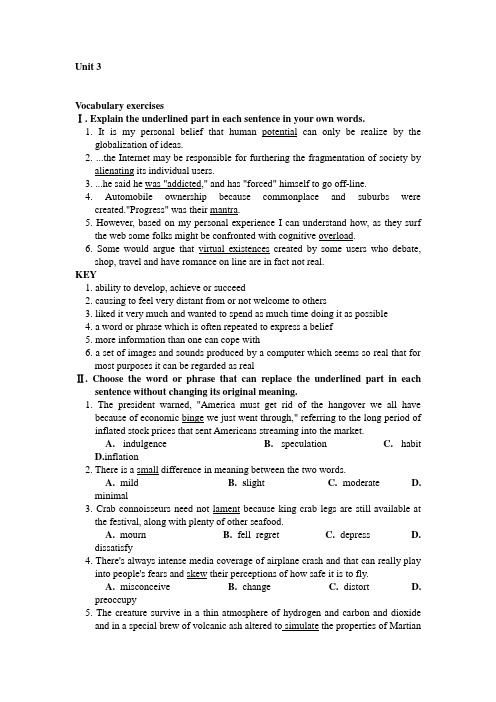
Unit 3Vocabulary exercisesⅠ. Explain the underlined part in each sentence in your own words.1. It is my personal belief that human potential can only be realize by theglobalization of ideas.2. ...the Internet may be responsible for furthering the fragmentation of society byalienating its individual users.3. ...he said he was "addicted," and has "forced" himself to go off-line.4. Automobile ownership because commonplace and suburbs werecreated."Progress" was their mantra.5. However, based on my personal experience I can understand how, as they surfthe web some folks might be confronted with cognitive overload.6. Some would argue that virtual existences created by some users who debate,shop, travel and have romance on line are in fact not real.KEY1. ability to develop, achieve or succeed2. causing to feel very distant from or not welcome to others3. liked it very much and wanted to spend as much time doing it as possible4. a word or phrase which is often repeated to express a belief5. more information than one can cope with6. a set of images and sounds produced by a computer which seems so real that formost purposes it can be regarded as realⅡ. Choose the word or phrase that can replace the underlined part in each sentence without changing its original meaning.1. The president warned, "America must get rid of the hangover we all havebecause of economic binge we just went through," referring to the long period of inflated stock prices that sent Americans streaming into the market.A. indulgenceB. speculationC.habitD.inflation2. There is a small difference in meaning between the two words.dB. s lightC. moderateD.minimal3. Crab connoisseurs need not lament because king crab legs are still available atthe festival, along with plenty of other seafood.A. mournB. fell regretC. depressD.dissatisfy4.There's always intense media coverage of airplane crash and that can really playinto people's fears and skew their perceptions of how safe it is to fly.A. misconceiveB.changeC. distortD.preoccupy5. The creature survive in a thin atmosphere of hydrogen and carbon and dioxideand in a special brew of volcanic ash altered to simulate the properties of Martiansoil, including its density, grain size and magnetic properties.A.pretend to beB.imitateC.reproduceD.unify6. This budget place short-term, political partisan gratification ahead of the nation'sneeds.A.satisfactionB.pleasureC.nominationD.bonus7. She gradually perceived that her parent had been right.A.noticedB.knewC.scceptedD.realized8. Reputation is important and a big international bank just can't afford to alienateclient in countries around the world.A separate B.give up C.discord D.distanceKEY.1. A2. B3. B4. C5. B6. A7. D8. DⅢ. Fill in the blank in each sentence with a phrase taken from the box in its appropriate form.at the expense of prior to give....pause to think take advantage ofbe availiable for in earnest for better life be confront with1. John's mind is always full of fantasies. He dreams of changing theworld________.2. Edward Stuart became a brilliant scholar, but only at__________ his health.3. The corporation was determined to push forward the policy of reform, but thenew system_________great difficulty at the start.4. In order to gain the utmost amount of benefit, this corporation________theexceptional opportunities open in exports.5. It present in satirical terms point made_________by catholic writers, whichproved to be a success.6. Two tennis courts and a swimming pool_______the regular members of the club,but the season tickets are only valid for three month.7. According to the Federal Bureau of inspection, a man seen hanging around thearea_____the shooting could have been involved in the assassination of the President.8. An opposition statement said he hoped theagreement________them________about the futility of violence.KEY1. for the better2. at the expense of3. was confronted with4. took advantage of5. in earnest6. are available for7. prior to 8. would give ... pause to thinkⅣ. Explain meaning of the underlined word or phrase in each sentence.1. Large deposit of limestone and clay can be found in the northern reaches of thestate of Washington.2. Several colleges and universities in the United States are now requiring that theirstudents purchase personal computers.3. The use of mechanical refrigerators became widespread in United States in the1920's.4. Could we go out tomorrow night instead? I'd rather have a quiet evening intonight.5. Becky will fill you in on what happened at the last meeting.6. You can lose yourself in a sea of identical hairstyles and thought styles.KEY1. expanses2. thinking it necessary3. commonplace4. at home5. tell you6. large numberGrammar exerciseⅠ. Put the following into indirect speech.1. " I've been in London for a month, but so far I haven't had time to visit thetower," said Robert.2. " I was intending to do it tomorrow," he said, "but now I don't think I'll be ableto."3. "Why are so many people interested in on-line shopping?" asked the boy.4. "Don't make mountains out of molehills, Mary," John said.5. "When the bell rings take the meant out of the even," my mother said.6. "Let's surf the Internet ," said Ann.7. "Need I eat it all,mummy?" said the child." Yes, dear, you must, " said the mother.8. "Tom, you shouldn't spend all time chatting on the Internet," Mr Smith said. KEY1.Robert said he had been in London for a month, but so far he hadn't had time tovisit the tower.2. He said he had been intending to do it the next day, but then he didn't think hewould be able to.3. The boy asked Why so many people were interested in on-line shopping.4. John told Mary not to make mountains out of molehills.5. My mother told me to take the meat out of the oven when the bell rang.6. Ann suggested surfing the Internet.7. The child asked his mother if he had to/need eat it all and she said that hemust/had to.8. Mr. Smith advised Tom not to spend all his time chatting on the Internet.Ⅱ. Combine the sentences in each group into one, using at least one absolute construction.1. a. There had been no rain. b. The ground was dry.2. a. When I walked in, Grandpa was sitting at the kitchen table.b. The newspaper was spread before him.3. a. The boys leaned against the willow tree.b. Their fishing poles rested on sticks.c. Their eyes gazed at the bobs floating on the ripples4. a. Mark went homeward alone.b. His heart was full of strange emotion.5. a. The discussion had been completed.b. The chairman adjourned the meeting for half an hour.6. a. The cowboy dominates the pages of many magazines.b. His hair is dark and curly.c. His broad shoulder are sloping yet powerful.d. His expression is calm and confident.KEY1. There having been no rain, the ground was dry.2. When I walked in, Grandpa was sitting at the kitchen table, the newspaper spreadbefore him.3. The boys learned against the willow tree, fishing poles resting on sticks, eyesgazing at the bobs floating on the ripples.4.Mark went homeward alone, his heart full of strange emotion.5. The discussion completed, the chairman adjourned the meeting for half an hour.6. The cowboy dominates the pages of many magazines, his dark and curly, hisbroad shoulders sloping yet powerful and his expression calm and confident. Ⅲ. Fill in the blank with the gerund or the infinitive of the verb given in the brackets.1. I try to______(pacify) him but he refuse to ______(pacify) and went on_____(grumble)2. I am looking forward to______(see ) you.3. I object to _____(be treated) like a child.4. I don't feel like ___(do) on lined shopping.5. He hates ______(answer ) the phone, and very often just let it ____(ring)3. Two whole pages are devoted to ____ (report) yesterday's bomb explosion.KEY1. pacify, be pacified, grumbling2. seeing3. being treated4. doing5. answering, ring6. reportingⅣ. Review the following sentences. Start with the words given.1. He had hardly arrived when she started complaining.Hardly ________________________________________________2. Once Manton gets logged on the Net, he rarely care anything else.Rarely ________________________________________________3. You must not touch this switch under any circumstances.Under no circumstance ___________________________________4. They have never known such hardships in all their lives.Never _________________________________________________5. He worries so much about his financial position that he can't sleep at night.So much _______________________________________________6. He spoke not only more correctly but also more convincingly.Not only _______________________________________________7. They succeeded only after several trails.Only __________________________________________________KEY1. Hardly had he arrived when she stared complaining.2. Rarely does Maton care about anything else once he gets logged on to the Net.3. Under no circumstance must you touch this switch.4. Never in all their lives have they known such hardships.5. So much does he worry about his financial position that he can't sleep at night.6. Not only did he speak more correctly but also more convincingly.7. Only after several trials did they succeed.Ⅴ. Make sentences of your own after the sentences given below, keeping the underlined structures in your sentences.1. It is my personal belief that the human potential can only be realized by theglobalization of ideas.2. He said that he felt like an alcoholic, in that moderate use of the Internet was justnot possible for him.3. All of this being said, I believe that the key to realizing the potential of theInternet is in achieving balance in out lives.KEY1. It is my hope that you will not give up your effort.It was my belief that our team will win the game.2. I am ready to accept your proposal in that I believe it to be the best you can offer.This machine differs from other one in that it is more powerful.3. All things being considered, I think I ought to award the scholarship to John.So many members being absent, the meeting had to be put off.TranslationⅠ. Translated the following sentences in to English, using the words or phrases given in the brackets.1. 15年来,医生们一直用抗癌药治疗这种疾病的,这些药就像大锤一样打垮患者体内的防御力量。
新版新视野大学英语读写教程第四册unit3答案
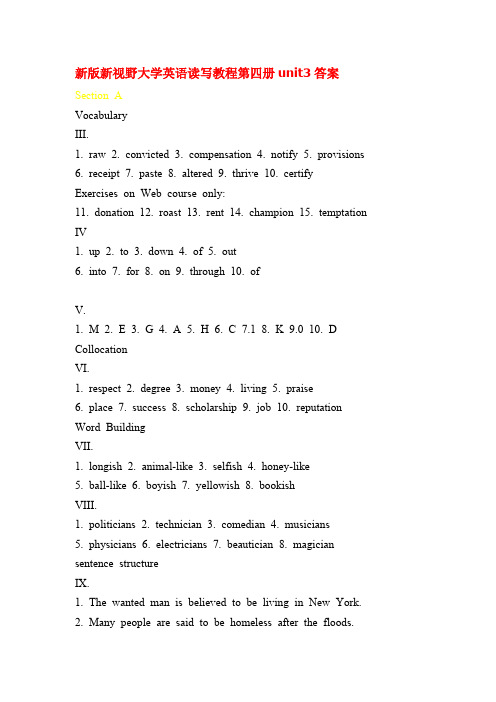
新版新视野大学英语读写教程第四册unit3答案Section AVocabularyIII.1. raw2. convicted3. compensation4. notify5. provisions6. receipt7. paste8. altered9. thrive 10. certify Exercises on Web course only:11. donation 12. roast 13. rent 14. champion 15. temptation IV1. up2. to3. down4. of5. out6. into7. for8. on9. through 10. ofV.1. M2. E3. G4. A5. H6. C7.18. K9.0 10. D CollocationVI.1. respect2. degree3. money4. living5. praise6. place7. success8. scholarship9. job 10. reputation Word BuildingVII.1. longish2. animal-like3. selfish4. honey-like5. ball-like6. boyish7. yellowish8. bookishVIII.1. politicians2. technician3. comedian4. musicians5. physicians6. electricians7. beautician8. magician sentence structureIX.1. The wanted man is believed to be living in New York.2. Many people are said to be homeless after the floods.3. Three men are said to have been arrested after the explosion.4. The prisoner is thought to have escaped by climbing over the wall.5. Four people are reported to have been seriously injured in the acci dent.X.1. He tried sending her flowers, but it didn't have any effect.2. I don't regret telling her what I thought, even if I upset her.3. The window was broken because I forgot to close it when I left.4. We regret to inform you that the materials you ordered are out of stock.5. He welcomed the new student and then went on to explain the col lege regulations.TranslationXI.1. Seven or eight officials are reported to have taken bribes and the mayor has decided to look into theaffair in person.2. These workers regret yielding to the management's advice and going back to work. Now they areagain faced with the threat of losing their jobs.3. You only need to fill out a form to get your membership, which e ntitles you to a discount on goods.4. Their car broke down halfway for no reason. As a result they arri ved three hours later than they hadplanned.5. The official got involved in a scandal and was forced to resign we eks later.6. The man living on welfare began to build up his own market, one step at a time and his business isthriving.XII1.据报道这个男子曾在私下说:“许多救济对象在欺骗我们,因此,作为补偿,我们有权让他们对我们点头哈腰。
大学体验英语综合教程4(第三版)课后习题及答案
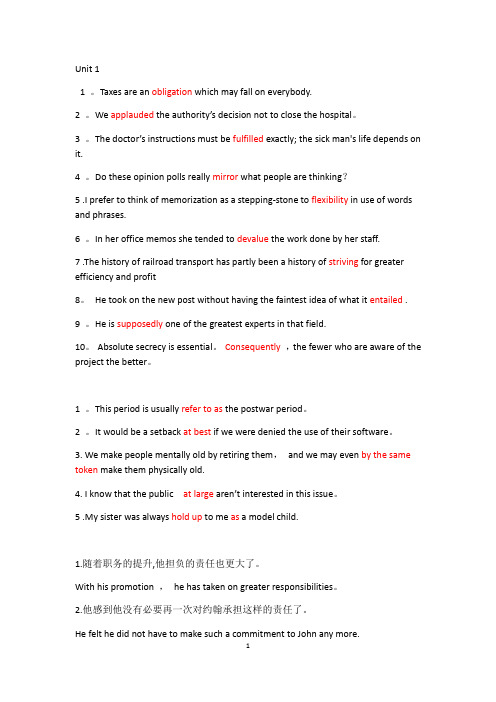
Unit 11 。
Taxes are an obligation which may fall on everybody.2 。
We applauded the authority’s decision not to close the hospital。
3 。
The doctor’s instructions must be fulfilled exactly; the sick man's life depends on it.4 。
Do these opinion polls really mirror what people are thinking?5 .I prefer to think of memorization as a stepping-stone to flexibility in use of words and phrases.6 。
In her office memos she tended to devalue the work done by her staff.7 .The history of railroad transport has partly been a history of striving for greater efficiency and profit8。
He took on the new post without having the faintest idea of what it entailed .9 。
He is supposedly one of the greatest experts in that field.10。
Absolute secrecy is essential。
Consequently,the fewer who are aware of the project the better。
1 。
This period is usually refer to as the postwar period。
2021年公共英语PETS四级习题及答案(卷三)

2021年公共英语PETS四级习题及答案(卷三)Research on animal intelligence always makes me wonder just how smart humans are. ___1___ the fruit-fly experiments described in Carl Zimmer's piece in the Science Times on Tuesday. Fruit flies who were taught to be smarter than the average fruit fly ___2___ to live shorter lives. This suggests that ___3___ bulbs burn longer, that there is an ___4___ in not being too terrifically bright.Intelligence, it ___5___ out, is a high-priced option. It takes more upkeep, burns more fuel and is slow ___6___ the starting line because it depends on learning — a gradual ___7___ —instead of instinct. Plenty of other species are able to learn, and one of the things they've apparently learned is when to ___8___.Is there an adaptive value to ___9___ intelligence? That's the question behind this new research. I like it. Instead of casting a wistful glance ___10___ at all the species we've left in the dust I.Q.-wise, it implicitly asks what the real ___11___ of our own intelligence might be. This is ___12___ the mind of every animal I've ever met.Research on animal intelligence also makes me wonder what experiments animals would ___13___ on humans if they had the chance. Every cat with an owner, ___14___, is running a small-scale study in operant conditioning. We believe that ___15___ animals ran the labs, they would test us to ___16___ the limits of our patience, ourfaithfulness, our memory for terrain. They would try to decide what intelligence in humans is really ___17___, not merely how much of it there is. ___18___, they would hope to study a ___19___ question: Are humans actually aware of the world they live in? ___20___ the results are inconclusive.1. [A] Suppose [B] Consider [C] Observe [D] Imagine2. [A] tended [B] feared [C] happened [D] threatened3. [A] thinner [B] stabler [C] lighter [D] dimmer4. [A] tendency [B] advantage [C] inclination [D] priority5. [A] insists on [B] sums up [C] turns out [D] puts forward6. [A] off [B] behind [C] over [D] along7. [A] incredible [B] spontaneous [C] inevitable [D] gradual8. [A] fight [B] doubt [C] stop [D] think9. [A] invisible [B] limited [C] indefinite [D] different10. [A] upward [B] forward [C] afterward [D] backward11. [A] features [B] influences [C] results [D] costs12. [A] outside [B] on [C] by [D] across13. [A] deliver [B] carry [C] perform [D] apply14. [A] by chance [B] in contrast [C] as usual [D] for instance15. [A] if [B] unless [C] as [D] lest16. [A] moderate [B] overcome [C] determine [D] reach17. [A] at [B] for [C] after [D] with18. [A] Above all [B] After all [C] However [D] Otherwise19. [A] fundamental [B] comprehensive [C] equivalent [D] hostile20. [A] By accident [B] In time [C] So far [D] Better still答案1. B 2. A 3. D 4. B 5. C6. A7. D8. C9. B 10. D11. D 12. B 13. C 14. D 15. A16. C 17. B 18. A 19. A 20. CDirections:Read the following text. Choose the best word(s) for each numbered blank and mark [A], [B], [C] or [D] on ANSWER SHEET 1. (10 points) Ancient Greek philosopher Aristotle viewed laughter as “a bodily exercise precious to health.”But ___1____some claims to the contrary, laughing probably has little influence on physical fitness Laughter does ___2___short-term changes in the function of the heart and its blood vessels, ____3___ heart rate and oxygen consumption But because hard laughter is difficult to ___4___, a good laugh is unlikely to have ___5___benefits the way, say, walking or jogging does.___6____, instead of straining muscles to build them, as exercise does, laughter apparently accomplishes the ___7___, studies dating back to the 1930’s indicate that laughter___8___ muscles, decreasing muscle tone for up to 45 minutes after the laugh dies down.Such bodily reaction might conceivably help ___9___the effects ofpsychological stress. Anyway, the act of laughing probably does produce other types of ___10___ feedback, that improve an individual’s emotional state. ___11___one classical theory of emotion, our feelings are partially rooted ___12___ physical reactions. It was argued at the end of the 19th century that humans do not cry ___13___they are sad but they become sad when the tears begin to flow.Although sadness also ___14___ tears, evidence suggests that emotions can flow ______15_________ muscular responses. In an experiment published in 1988,social psychologist Fritz Strack of the University of würzburg in Germany asked volunteers to ____16____ a pen either with their teeth-thereby creating an artificial smile –or with their lips, which would produce a(n) ____17____ expression. Those forced to exercise their smiling muscles ___18___ more exuberantly to funny cartons than did those whose mouths were contracted in a frown, ___19___ that expressions may influence emotions rather than just the other way around ___20___ , the physical act of laughter could improve mood.1.[A]among [B]except [C]despite [D]like2.[A]reflect [B]demand [C]indicate [D]produce3.[A]stabilizing [B]boosting [C]impairing [D]determining4.[A]transmit [B]sustain [C]evaluate [D]observe5.[A]measurable [B]manageable [C]affordable [D]renewable6.[A]In turn [B]In fact [C]In addition [D]In brief7.[A]opposite [B]impossible [C]average [D]expected8.[A]hardens [B]weakens [C]tightens [D]relaxes9.[A]aggravate [B]generate [C]moderate [D]enhance10.[A]physical [B]mental [C]subconscious [D]internal11.[A]Except for [B] According to [C] Due to [D] As for12.[A]with [B]on [C]in [D]at13.[A]unless [B]until [C]if [D]because14.[A]exhausts [B]follows [C]precedes [D]suppresses15.[A]into [B]from [C]towards [D]beyond16.[A]fetch [B]bite [C]pick [D]hold17.[A]disappointed [B]excited [C]joyful [D]indifferent18.[A]adapted [B]catered [C]turned [D]reacted19.[A]suggesting [B]requiring [C]mentioning [D]supposing20.[A]Eventually [B]Consequently [C]Similarly [D]Conversely1-5 CDBBA 6-10 BADCA 11-15 BCDCB 16-20 DADAC1.C解析:语义逻辑题。
- 1、下载文档前请自行甄别文档内容的完整性,平台不提供额外的编辑、内容补充、找答案等附加服务。
- 2、"仅部分预览"的文档,不可在线预览部分如存在完整性等问题,可反馈申请退款(可完整预览的文档不适用该条件!)。
- 3、如文档侵犯您的权益,请联系客服反馈,我们会尽快为您处理(人工客服工作时间:9:00-18:30)。
《大学英语四》习题三答案大学英语四(Model Test 3)一、交际英语 Communicative English (本大题共10小题,每小题2分,共20分)1.—How are you,Bob?一 B Ted.A.How are you? B.I’m fine.Thank you.C.How do you do? D.Nice to meet you.2.—Thanks for your help.— AA.My pleasure.B.Never mind.C.Quite right.D.Don’t thank me3.一Hello.I’m Harry Potter.一Hello,my name is Charles Green,but C .A.call my Charles B.call me at CharlesC.call me Charles D.call Charles me4.一Paul, A ?一Oh,that’s my father! And beside him,my mother.A.what is the person over thereB.who’s talking over thereC.what are they doingD.which is that5.一Hi,Tom,how’s everything with you?— B ,and how are you?A.Don’t mention it B.Hmm, not too badC.Thanks D.Pretty fast6.一That’s a beautiful dress you have on!— AA.Oh,thanks.I got it yesterday.B.Sorry,it’s too cheap.C.You can have it.D.See you later.7.一Why didn’t you come to my birthday party yesterday?一 DA.Excuse me,my friend sent me a flower.B.Fine,I never go to birthday parties.C.Ha…ha,I don’t like birthday parties.D.Sorry,but my wife had a car accident8.一Hi,welcome back!Had a nice trip?一 AA.Oh,fantastic!Fresh air,and sunshine every day.B.Come on.I’ve got lots of fun.C.By the way,I don’t like Saturdays.D.Well,I'll look forward to your phone call.9.一Haven’t seen you for a ges!What are you busy doing now?一 DA.1 hate the weather here.B.My hair is getting a bit longer.C.Yeah,thanks for coming.D.I am working part time in a bookshop,you know.10.一Marilyn,I'm afraid I have to be leaving now.— BA.That sounds wonderful.B.Oh,so early?C.Not at a11.D.Good luck!二、词汇语法 Vocabulary and Grammar(本大题共15小题,每小题2分,共30分)11. Would you like something _______B_______?A. drinkB. to drinkC. drinkingD. for drinking12. The wild flowers looked like a soft orange blanket _____A_______ the desert.A. coveringB. coveredC. coverD. to cover13. ______D_____ is the population of Paris?A. How manyB. How muchC. HowD. What14. As the busiest woman there, she made ___D________her duty to look after all the other people's affairs in that town.A. thisB. thatC. oneD. it15. It was getting ______C_____ , he had to stop to have a rest.A. very darkerB. dark and darkC. darker and darkerD. darkest and darkest16. This overcoat cost ____B_______. What's more, they are __________small for me.A. very much; veryB. too much; much tooC. much too; too muchD. very much; too much17. The film brought the hours back to me A I was taken good care of in that remote village.A. whenB. whereC. thatD. until18. — Did the medicine make you feel better?— No. The more _____B______, ___________ I feel.A. medicine I take; and the worseB. medicine I take; the worseC. I take medicine; the worseD. I take medicine; worse19. It is not until you have lost your health ____D________ you know its value.A. untilB. whenC. whatD. that20. It's high time that he settled down in the country and B a new life.A. startB. startedC. startingD. to start21.I won’t make the _B__mistake next time.A. likeB. sameC. nearD. similar22.----The baby is hungry.----But there’s __A_milk in the bottle.A. littleB. a littleC. fewD. a few23.----_B__is your girl friend like?----She is very kind and good-lookingA. HowB. WhatC. WhichD. Who24.----She has two best friends.----__D_of them is in the country.A. AllB. BothC. No oneD. Neither25. You __B__ buy some reference books when you go to the college.A. couldB. will have toC. must toD. might三、阅读理解 Reading Comprehension本大题共15小题,每小题2分,共30分Passage 1How men first learnt to invent words is unknown; in other words, the origin of language is a mystery. All we really known is that men, unlike animals, somehow invented certain sounds to express thought and feelings, actions, and things, so that they could communicate with each other; and that later they agreed upon certain signs, called letters, which could be combined to represent those sounds, and which could be written down. Those sounds, whether spoken or written in letters, we call words.The power of words, then, lies in their associations - the things they bring up before our minds. Words become filled with meaning for us by experience; and the longer we live, the more certain words recall to us the glad and sad events of our past; and the more we read and learn, the more the number of words that mean something to us increases.Great writers are those who not only have great thoughts but also express these thoughts in words which appeal powerfully to our minds and emotions. This charming and telling use of words is what we call literary style. Above all, the real poet is a master of words. He can convey his meaning in words which sing like music and which by their position and association can move men to tears. We should therefore learn to choose our words carefully and use them accurately, or they will make our speech silly and vulgar . (239words)26. The origin of language is _______D__________A. a legend handed down from the pastB. a matter that is hidden or secret.C. a question difficult to answer.D. a problem not yet solved.27. What is true about words? ______C__________A. They are used t to express feelings only.B. They can not be written downC. They are simply sounds.D. They are mysterious.28. The real power of words lies in their ___D________.A. propertiesB. characteristicsC. peculiarityD. representative function29. By “association”, the author means ______B_______.A. a special qualityB. a joining of ideas in the mind.C. an appearance which is puzzling.D. a strange feature.30. Which of the following statements about the real poet is NOT true? ___A_______A. He is no more than a master of words.B. He can convey his ideas in words which sing like music.C. He can move men to tears.D. His style is always charming.Passage 2Long, long ago there was a very foolish thief. Do you know what he did one day? When he wanted to steal the bell on his neighbor's door, he walked up to the door, took hold of the bell and pulled hard. The bell made a very loud noise. The thief was afraid and went home.Then he sat down to think, "I must do something about the noise," he said. He thought and thought. At last he had an idea. "Ah, I'll put some cotton in my ears. Then I won't be able to hear the noise." The next day he went to the door of his neighbor, and took hold of the bell. This time he pulled even harder. The bell rang loudly, but the thief did not hear anything. With another hard pull he got the bell out. Just then the neighbor came running out."Steal my bell? I'll teach you a lesson," the angry man shouted. And he hit the thief on the nose.The foolish thief did not know how the neighbor found out he was stealing the bell. "Why did he come out just then?" he wondered.31. The thief was trying to get his neighbor's doorbell.AA. TB. F32. The thief put some cotton in his ears so as not to hear anythingA.A. TB. F33. The neighbor ran out probably because he knew his doorbell was being stolen.AA. TB. F34. The neighbor hit the thief to punish him for stealing.AA. TB. F35. The thief thought the neighbor couldn't hear the noise of the bell.AA. TB. FPassage 3It has been reported that in colleges across the United States, the daytime serial drama known as the soap opera has suddenly become "in". Between the hours of 11 a.m. and 4:30 p.m, college television lounges are filled with soap opera fans who can't wait to see the next episode in the lives of their favorite characters.Actually, soaps are more than a college favorite; they're a youth favorite. When school is out, high-school students are in front of their TV sets. One young working woman admitted that she turned down a higher paying job rather than give up watching her favorite serials. During the 1960's, it was uncommon for young people to watch soap operas. The mood of the sixties was very different from now. It was a time of seriousness, and talk was about social issues of great importance.Now, seriousness has been replaced by fun. Young people want to be happy. It may seem strange that they should turn to soap opera, which is known for showing trouble in people's lives. But soap opera is enjoyment. Young people can identify with the soap opera character, who, like the college-age viewer, is looking for happy love, and probably not finding it. And soap opera gives young people a chance to feel close to people without having to bear any responsibility for their problems.36. What is soap opera? ___C_____A. Plays based on science fiction stories.B. Plays based on non-fiction stories.C. The daytime serial dramas on TV.D. Popular documentary films on TV.37. What can be the best title of the passage? ___C_____A. College student viewers.B. Favorite TV serials.C. Soap opera fans.D. College-age viewers.38. Which is not the reason why the soap opera suddenly becomes "in" according to the passage? _____D___A. Because the viewers want to be happy and to enjoy themselves.B. Because the soap opera makes young people feel close to their people.C. Because the viewers can find themselves in the soap opera characters.D. Because the young people have to bear the responsibilities for their troubles.39. What can we learn from the passage? ___C_____A. College students like soap operas more than any other social groups.B. Young people of sixties liked soap operas more than people today.C. Young viewers have turned themselves from the seriousness of sixties to enjoyment now.D. The young as a whole are trying to look for happy love but in vain.40. What message does the author want to convey to us? ____B____A. The people's favor toward drama works has been changed for a long time.B. The people's favor toward drama works changes along with the times.C. The people's favor toward drama works is changed by the soap opera.D. The people's favor has changed the drama works.四、完形填空 Cloze(本大题共10小题,每小题1分,共10分)Homesickness is very common among students away from home — even those who had previously been away at overnight camp or traveled far away. There is a difference between being away from home for 8 weeks and being gone for 8 months. There is also a difference between 41 home for a while (knowing you will be going back) and leaving 42 (knowing you may never return). Feeling homesick does not make you less mature or mean you are not ready to be 43 . If you feel homesick, talk to your friends at school about it. 44 they are feeling the same way. 45 family and friends back home, but make sure you 46 new relationships at school. If your homesickness does not 47 and does not seem to be getting better after a few months at school, speaking with an adviser might help. Also, remember that going home for the first visit may be difficult 48 changes in yourself or your family. Old conflicts do not just disappear once you go to college, and new ones may 49 . Again, if things are too stressful for you 50 handle alone, talk to an adviser.B41. A. abandoning B. leaving C. being away D. heading for A42. A. forever B. temporarily C. for a short time D. all the timeD43. A. yourself B. lonely C. of your own D. on your ownA44. A. Most likely B. It’s impossible C. It’s lucky D. Make sureA45. A. Keep in touch with B. Contact with C. Keep contact in D. CommunicateD46. A. have built B. do C. formed D. developB47. A. go with B. go away C. go over D. go throughB48. A. thanks to B. because of C. because D. resulting inA49. A. appear B. rise C. raise D. growC50. A. too B. so C. to D. not五、作文 Essay Writing(本大题共10分)You are required to write a note to tell your boss that you cannot attend this afternoon’s meeting. You should write as least 80 words and base your note on the Chinese outline below:1. 你刚接到妻子电话2. 你不得不回家带小孩上医院看病3. 晚上跟老板联系。
